

Banging Backstage Cover Letter Example
If you are a professional actor or another performer, you have heard of the mythical Backstage. This is a platform as well as a community that allows both entertainers and creators to find film, stage, television, production, and voiceover projects to work on.
You may view job listings from all over the world, and apply for work directly from the site. Backstage is a bit like the Indeed of entertainment as almost every major studio including Netflix, Nickelodeon, HBO, and Disney use it to find cast members.
If you apply for a job via Backstage, you’ll have to include a cover letter along with other required materials. However, this isn’t quite like a standard cover letter. Instead, you are limited to 500 characters, not the standard 500 words.
So, you have to get it right without wasting any space. This article should help with that. We have a Backstage cover letter sample for you to review. In addition to that, we’ve included some tips for writing that letter and using Backstage to pitch yourself as a performer or production professional.
Backstage Cover Letter Example
Here is a sample Backstage cover letter you can use as writing props. Please note that it is much shorter than other types of cover letters and also features some deets that are not really seen in other cover letters. This is largely due to the casting process.
This letter is written by a male actor seeking an audition for an upcoming situation comedy.
My name is Paul Ninja. I’m an actor and stand-up comedian with a range of comedic experience on stage (Parker’s Club) and television (Utah ABC station). Stats are 5,10” 275, stocky, dad type, and balding. Great fit for goofy best friend, uncle, working-class dude, or dad. I also have episodic sitcom experience with Netflix. Please consider me for the role of Bucky Deavers in the upcoming production. I have no projects scheduled for the next 6 months and can audition at your convenience.
Backstage Cover Letter Writing Tips
Now for some tips on making the max out of that tiny word slot for expressing your interest in the upcoming gig. Here’s how to pack a punch in your short backstage cover letter:
Get Right To The Point
Remember that there’s no room or space here for lengthy introductions, expressing admiration for the company, or other “aspirational” content that you would probably include in the standard actor cover letter . Don’t even waste time on a salutation. Instead, open with a brief introduction and move immediately to your qualifications.

Always Include Your Availability
The casting notice will contain the dates and locations of the production, rehearsals, and auditions. These are generally not flexible, and will only change if the needs of the production company dictate they should. Thus, don’t expect to be able to schedule any readings or auditions outside of the given times and dates.
Instead, state very clearly that you are going to be available within the required time frame. This will let the reader know that they can rely on you and call you in on short notice. For most productions, this is crucial. Unless you are an A-lister, your availability can really make or break your chances of being seen.
Less Is More
Remember that the 500 character limit is your maximum. You don’t necessarily have to use all of that. Many actors have found that they have better look being even more concise. This is especially the case if you are going up for a role that is a fit for a wide range of ‘types’.
Sometimes, something as simple as, ‘My name is Jessica. I’m a 24-year-old actress and singer. I have musical theater experience. I’d like to be considered for this part.’ is enough to get that callback for an episodic role or short part.
Busy producers and casting directors may appreciate your brevity.
Do Your Research
The Backstage website has community pages and forums where people like you discuss the application process, different production companies, and tips and tricks for success. Join these, and take part in the conversations. Reach out to people who have gone up for similar roles, and who have worked for the same production companies. Similarly, there are acting groups on Reddit and other social media pages, discussing the experience with Backstage.
Find out as much as you can about the director, casting professional, producer, and production company. If you can find others who have earned roles through them, seek out their advice and insights.
Final Tip: Show That You Are A Fit For The Role
Submitting an application for an acting role is a bit different than the process for most other jobs. You have to get the recipient to visualize you in that role. In many cases, they have a very detailed physical description in mind. Many performers choose to include these attributes in their cover letter to show that they truly ‘fit the part’.
What if you don’t have the physical attributes listed in the casting call? That doesn’t necessarily exclude you. If that happens, make a convincing argument that you are still an excellent fit.
Other Cover Letter Samples
Cover letter example for teacher assistant (+ writing tips), a confident financial analyst cover letter example, cover letter for maintenance technician: example + tips, a banging banking cover letter example for financial professionals.
A huge collection of cover letters created by a ninja team of writers and career advisors. Learn how to write, style and file cover letters that employers actually enjoy reading.
© Copyright 2023 Cover Letter Ninjas
- Privacy Policy
- Cookie Policy
- Terms and Conditions
- Disclosure Policy

Acting Cover Letter
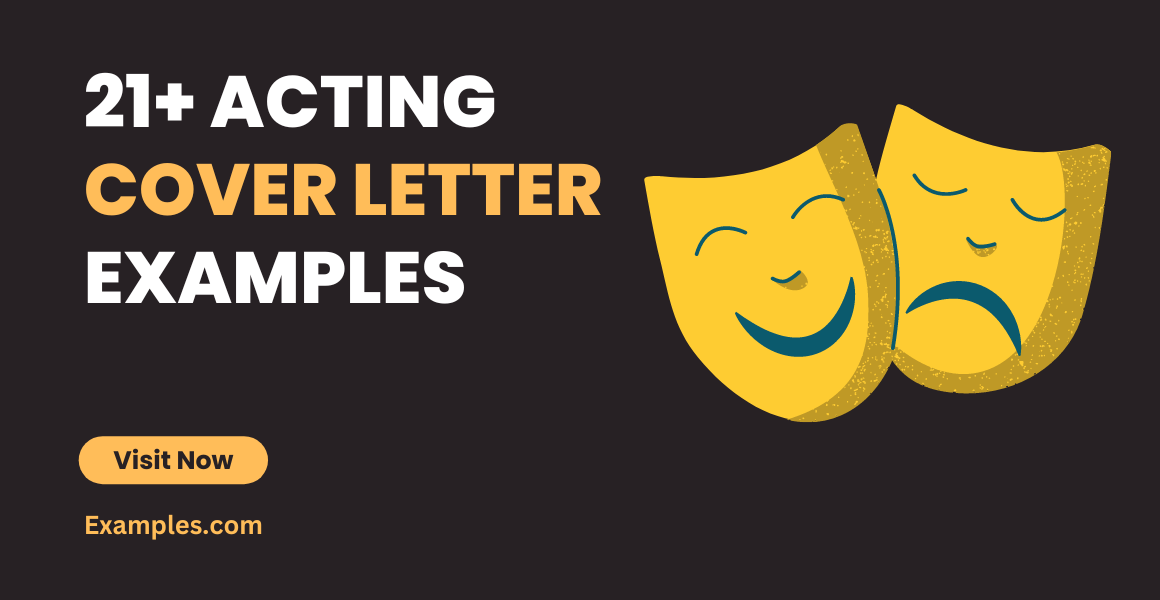
The acting world is full of opportunities, but also full of competition. One way to make your mark and open doors is through a well-crafted acting cover letter . A carefully written cover letter can catch a casting director’s eye, showcase your uniqueness, and make you stand out from the crowd. Here’s everything you need to know about creating a stellar acting cover letter.
What is an Acting Cover Letter?
An acting cover letter is a personalized introduction that accompanies your resume or headshot. It’s your chance to express interest in a specific role or project, summarize your acting experience, and showcase your unique attributes and passion. Essentially, it’s a sales pitch for your talent. See Blank Cover Letter Examples
What is an example of an Acting Cover Letter?
Jane Smith 123 Main St. New York, NY 10001 Phone: (123) 456-7890 Email: [email protected]
May 15, 2023
John Doe ABC Productions 456 Hollywood Ave. Los Angeles, CA 90001
Dear Mr. Doe,
I am writing to apply for the role of Mary in “The New Play.” Having performed in various theater productions over the past three years, I believe my passion for storytelling, my diverse acting skills, and my dedication to my craft make me a perfect fit for this role.
In my recent role as Laura in “The Glass Play,” I was commended for my ability to connect with the character and bring authenticity to the performance. I am drawn to Mary’s complexity in “The New Play” and am eager to bring my unique interpretation to this character.
Thank you for considering my application. I look forward to the opportunity to audition and hopefully work with you on this exciting project.
Sincerely, Jane Smith
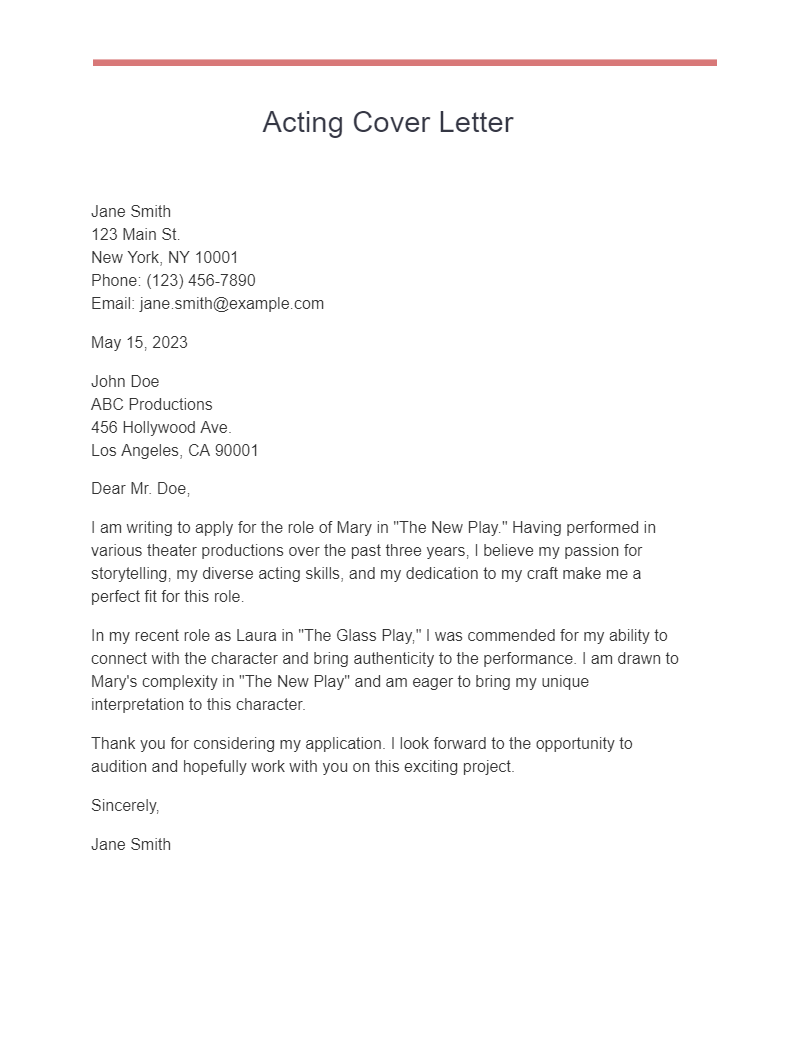
Size: 31 KB
Free Acting Cover Letters – Copy & Paste
Feel free to browse the good cover letter examples below for different roles and circumstances. Each cover letter is distinct, catering to various acting needs.
Acting Cover Letter Format
When writing an acting cover letter, it’s important to follow a professional format. Here’s an example:
[Your Name] [Address] [Phone Number] [Email]
[Recipient’s Name] [Company/Agency] [Address]
Dear [Recipient’s Name],
I am reaching out to express my interest in the role of [Role Name] in [Production’s Name]. With a strong background in [Specific Acting Experience], I believe I can bring a unique perspective to this character.
Throughout my career, I’ve had the opportunity to work with diverse directors, performers, and scriptwriters, enhancing my ability to adapt and create compelling performances. I am excited about the opportunity to contribute my skills and energy to your team.
Thank you for considering my application. I look forward to the chance to discuss further how I can fit into this role.
Sincerely, [Your Full Name]
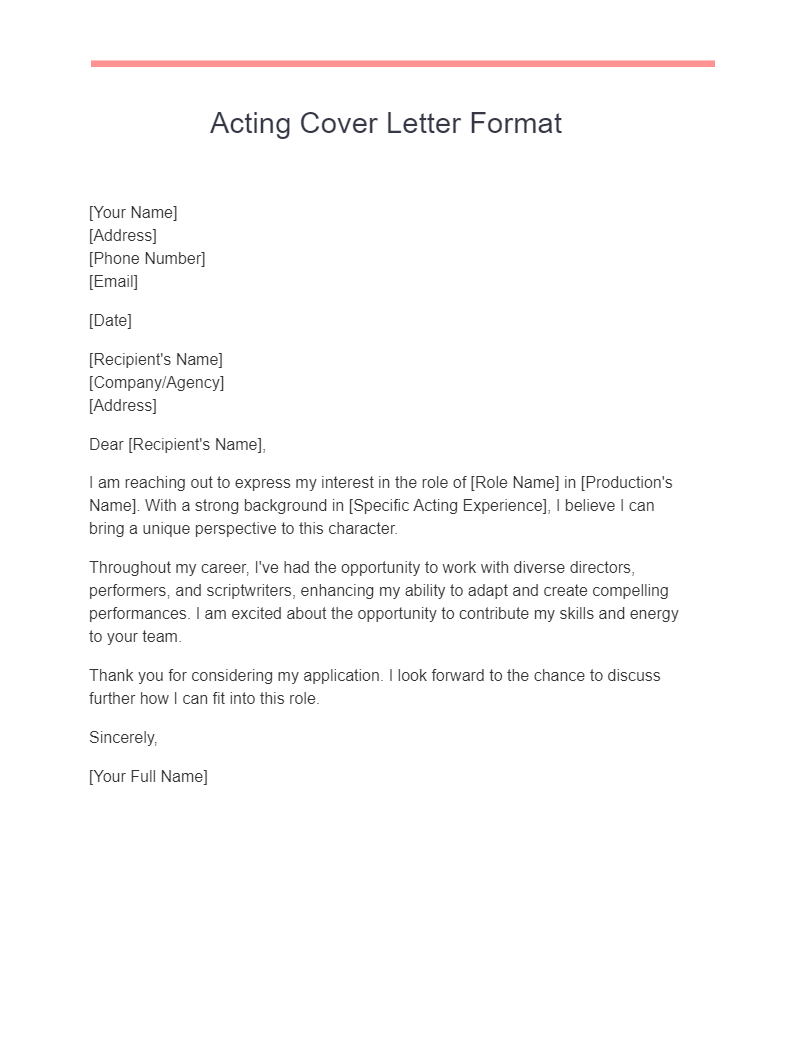
Size: 25 KB
New Actor Cover Letter Example
For actors new to the industry, a cover letter is a way to showcase your passion, potential, and willingness to learn. Here’s a sample:
Although new to the professional acting scene, I am excited to bring my fresh perspective, raw talent, and undying passion for performance to the role of [Character’s Name] in [Production’s Name]. My recent experience in community theater and acting workshops has honed my skills, and I am ready to take on the challenge of a professional role.
I am drawn to this character because [Reasons Related to the Character]. I believe I can bring an authentic and unique interpretation that resonates with audiences.
Thank you for considering me for this opportunity. I eagerly await the chance to audition and show you what I can bring to this role.
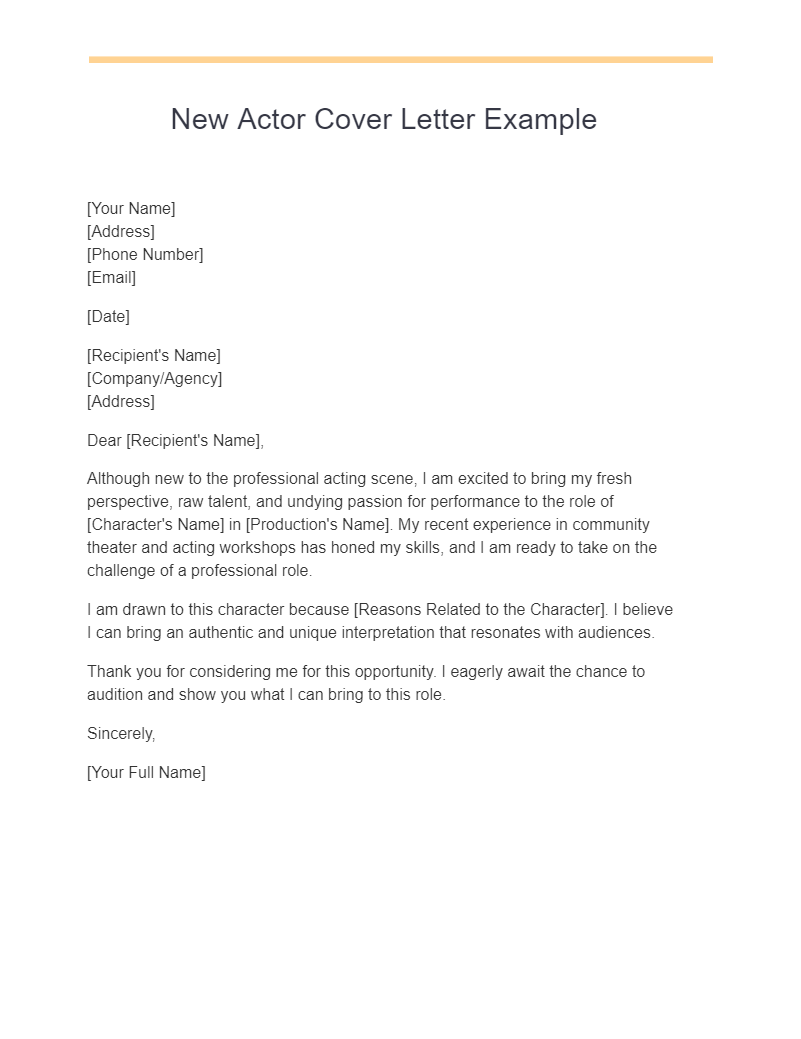
Size: 26 KB
Acting Cover Letter with No Experience Example
Entering the world of acting without experience doesn’t mean you lack potential. Here’s a cover letter with no experience that emphasizes other attributes:
While I may not have professional acting experience, my passion for the craft, my dedication to learning, and my natural ability to inhabit diverse characters make me a promising fit for the role of [Character’s Name] in [Production’s Name]. My background in [Related Field] has allowed me to develop skills that directly translate to the acting world, such as [Specific Skills].
I am excited about the chance to learn, grow, and contribute to your production. I look forward to the opportunity to discuss further how I can fit into this role.
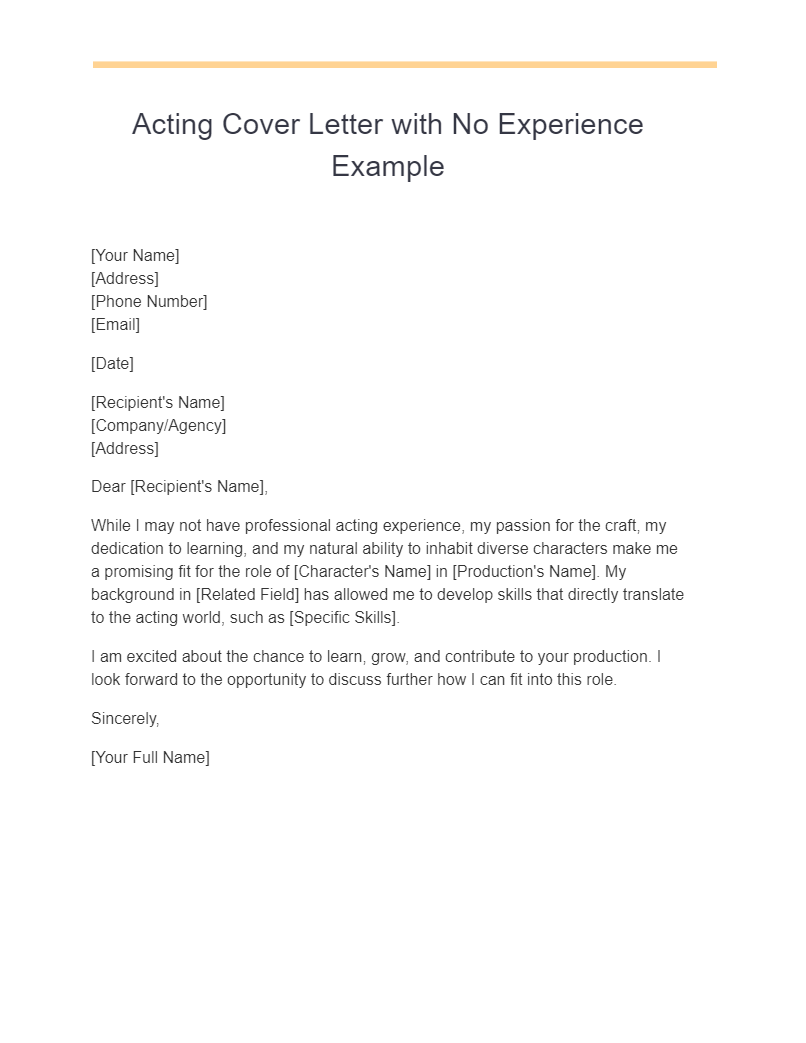
Size: 29 KB
Experienced Actor Cover Letter Example
As an experienced actor, your cover letter should reflect your portfolio, range, and how you align with the particular casting call. Here’s an example:
With over 10 years of experience in both film and theater, I am writing to express my interest in the role of [Character’s Name] in [Production’s Name]. My diverse portfolio includes roles such as [Past Roles], showcasing my ability to adapt, interpret, and bring characters to life.
I believe my extensive experience, professional approach, and artistic insight align perfectly with the needs of this character. I look forward to the opportunity to contribute to your production and bring [Character’s Name] to life.
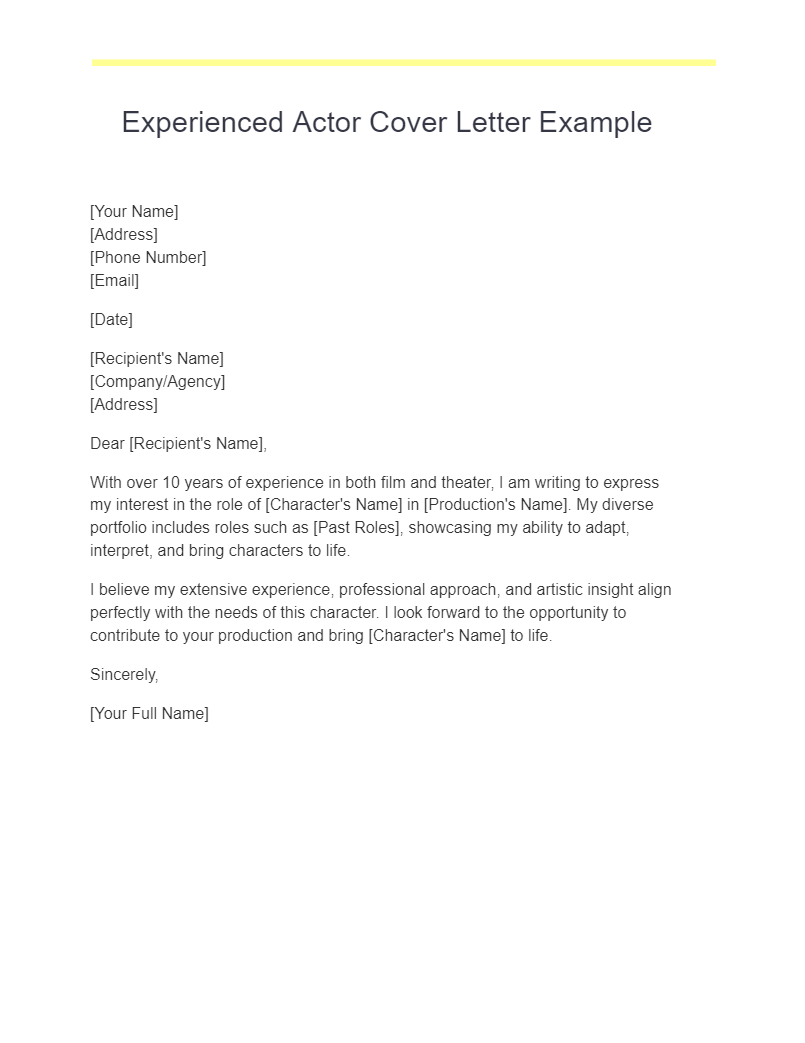
Actor Cover Letter Example
If you’re an actor seeking a specific role, your cover letter should highlight your unique attributes, experiences, and alignment with the character. Here’s an example:
I am writing to apply for the role of [Character’s Name] in [Production’s Name]. With my previous experience as [Previous Roles] and my unique approach to storytelling, I believe I can bring a fresh and compelling interpretation to this character.
Your production’s focus on [Specific Themes or Style] resonates with my own artistic vision, and I am excited about the opportunity to contribute my skills, creativity, and dedication to this project.
Thank you for considering my application. I look forward to the chance to audition and discuss how I can
contribute to this exciting project.
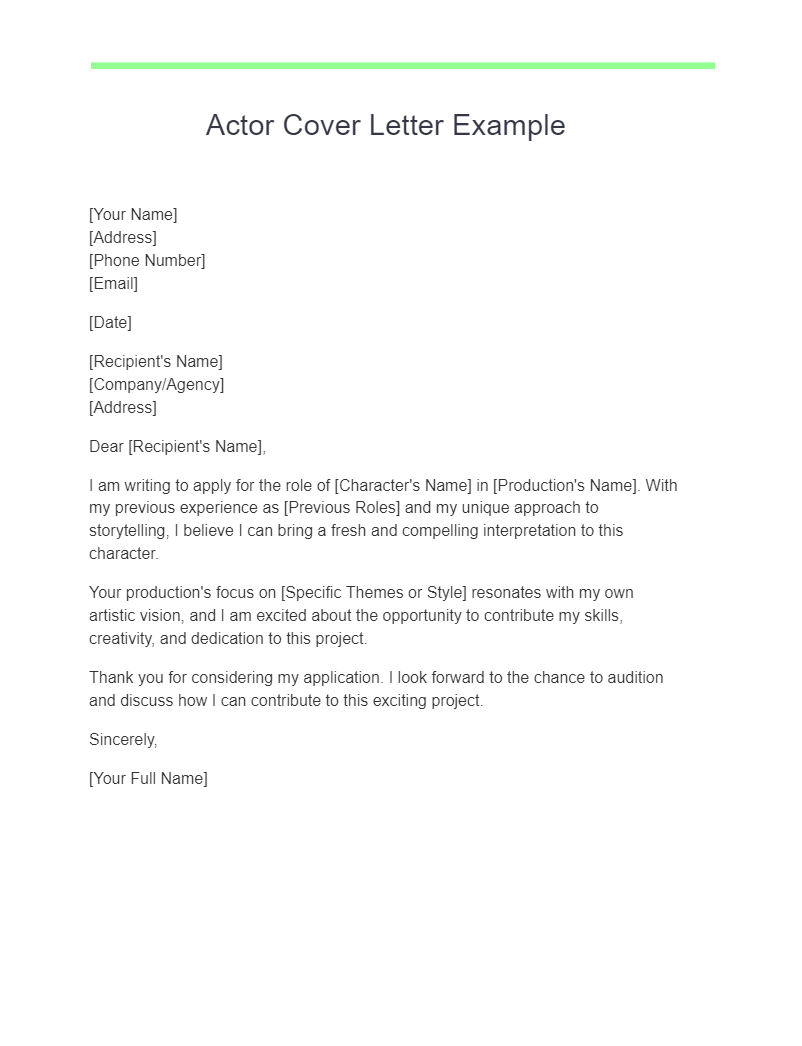
Actress Cover Letter Example
An actress can use her cover letter to emphasize her range, previous performances, and alignment with a particular role. Here’s an example:
I am excited to apply for the role of [Character’s Name] in [Production’s Name]. With my background in both film and theater, including roles such as [Previous Roles], I believe I have the versatility and artistic sensibility needed for this character.
Your production’s emphasis on [Specific Themes or Style] aligns with my passion for storytelling, and I am eager to bring my energy, creativity, and commitment to this role.
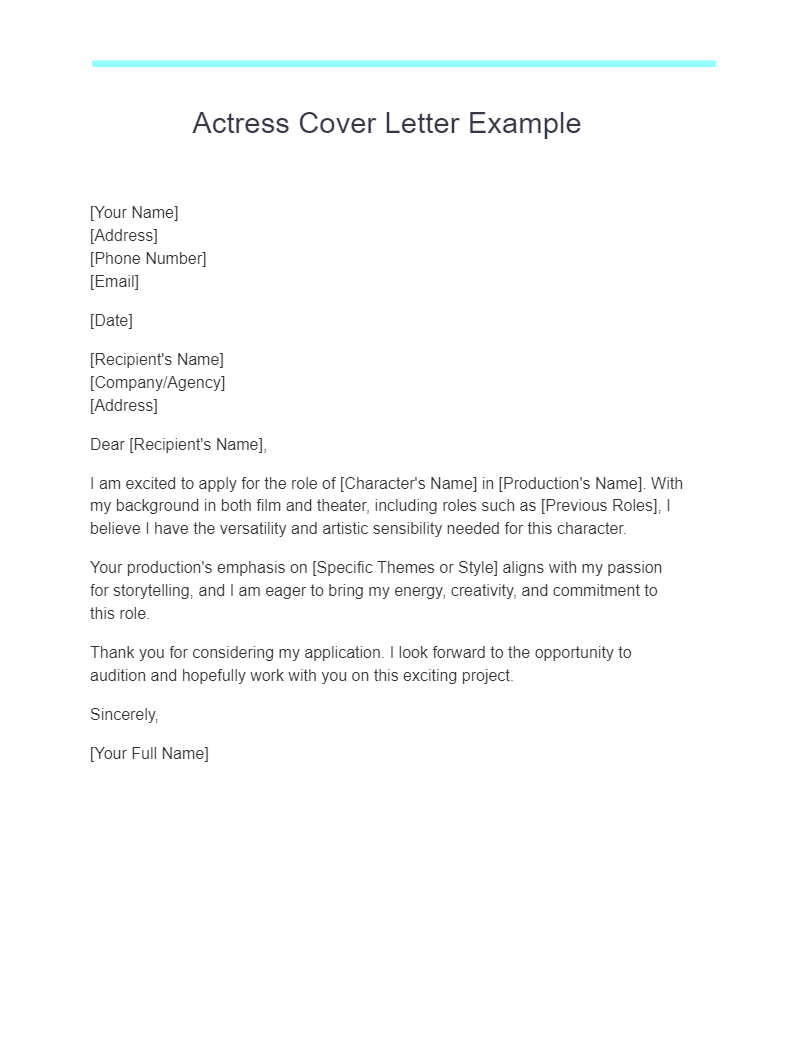
Acting Cover Letter for Agents Example
Seeking representation from an agent requires a clear expression of your marketability, portfolio, and alignment with the agent’s focus. Here’s a sample:
[Agent’s Name] [Agency’s Name] [Address]
Dear [Agent’s Name],
I am writing to seek representation from your esteemed agency. With a portfolio that includes roles in [Specific Productions], awards such as [Awards], and a dedication to continued growth, I believe my talents align with your agency’s focus on [Agency’s Specialization].
My unique approach to acting, my ability to connect with diverse audiences, and my commitment to professional development make me an exciting prospect for representation. I am eager to discuss how we can work together to further my career and contribute to your agency’s success.
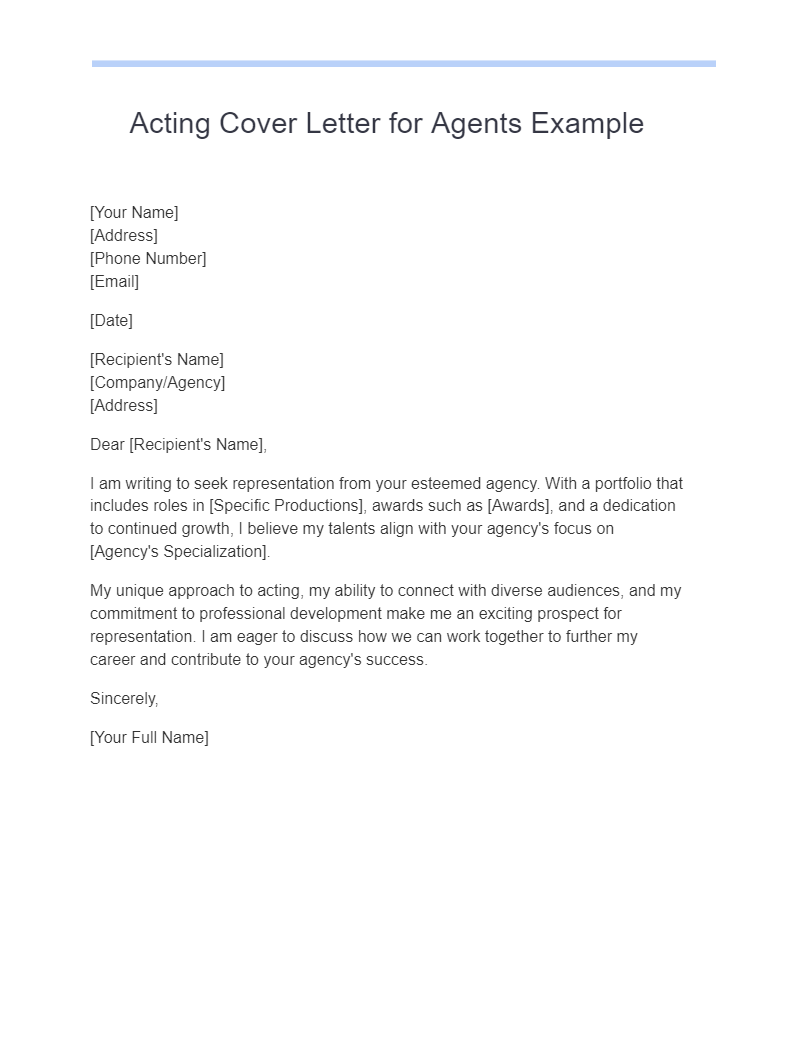
Backstage Cover Letter Example
Working backstage requires technical skills, a commitment to the production process, and an understanding of the various roles. Here’s an example:
With a passion for the technical side of theater and an extensive background in [Specific Backstage Roles], I am excited to apply for the backstage position in your upcoming production of [Production’s Name].
My previous experiences include work on productions such as [Previous Productions], where I was responsible for [Specific Responsibilities]. I understand the importance of precision, collaboration, and creativity in the backstage environment.
Thank you for considering my application. I look forward to the opportunity to contribute to your production’s success.
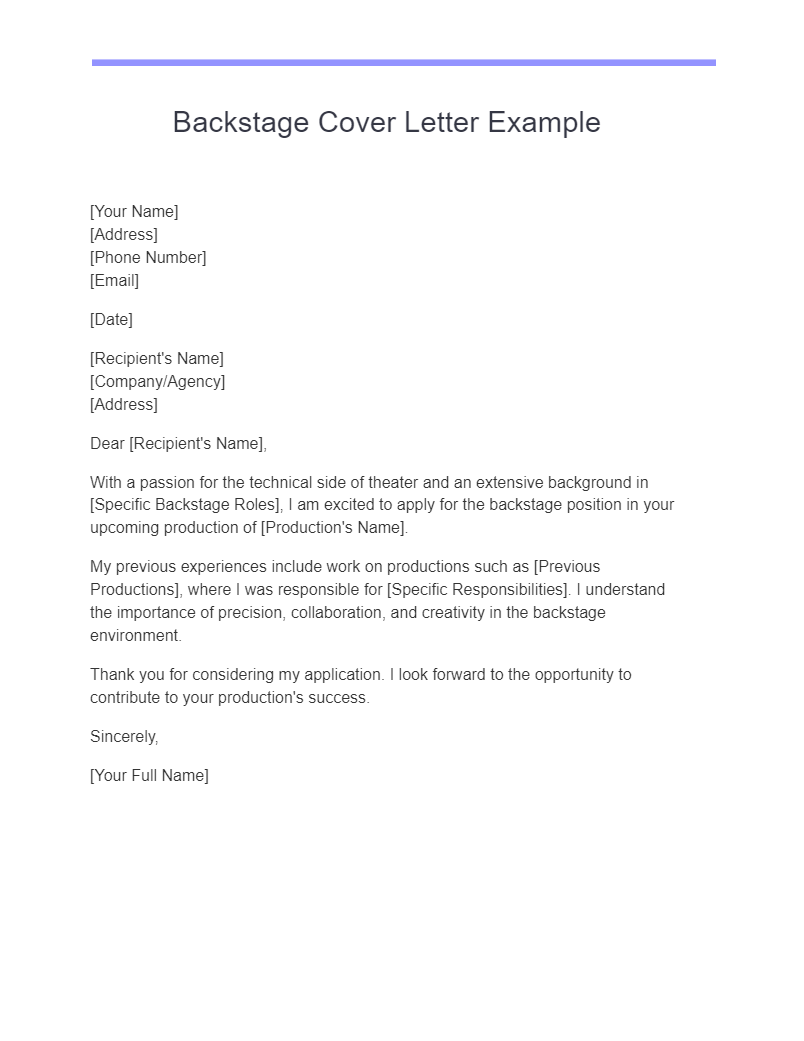
Acting Cover Letter to Casting Director Example
When addressing a casting director, it’s important to show understanding of the role, previous experiences, and eagerness to audition. Here’s a sample:
[Casting Director’s Name] [Production’s Name] [Address]
Dear [Casting Director’s Name],
I am writing to express my interest in the role of [Character’s Name] in [Production’s Name]. Having followed your casting work in [Previous Productions], I am excited about the opportunity to audition for a role in your current project.
My previous experiences include [Specific Roles], where I honed my skills and deepened my understanding of character development. I believe my approach to acting aligns with the needs of this character, and I am eager to bring my energy, creativity, and professionalism to this role.
Thank you for considering my application. I look forward to the opportunity to audition and discuss how I can contribute to your exciting project.
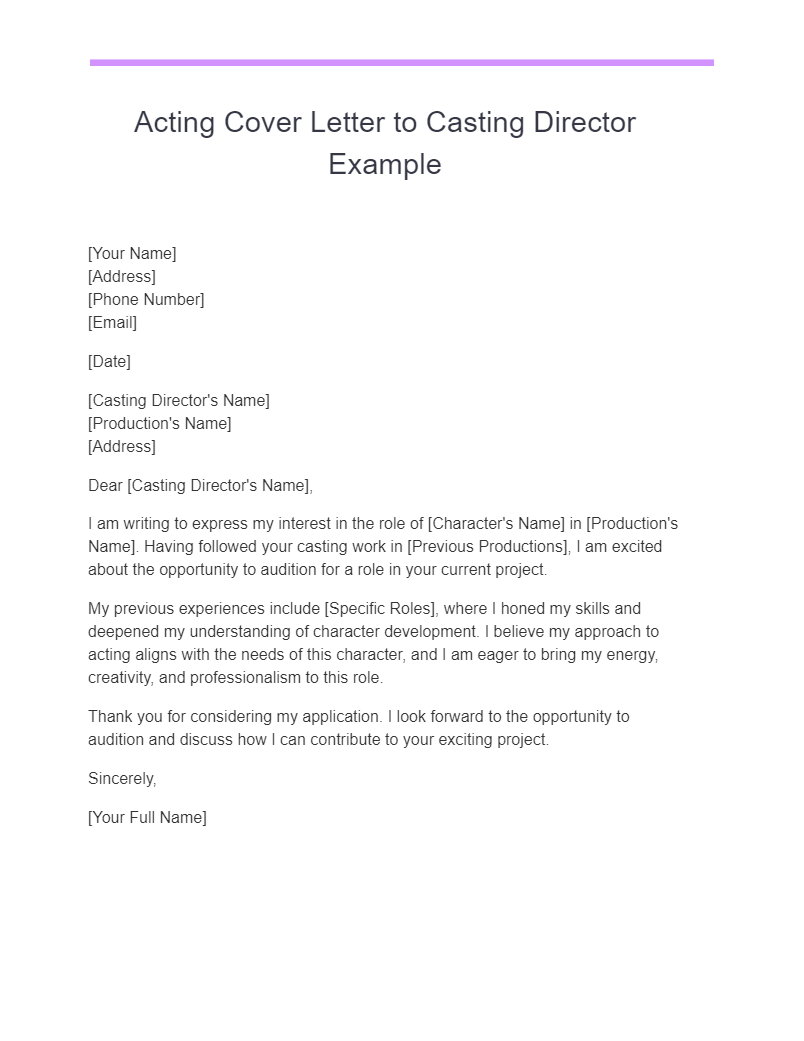
Sample Acting Cover Letter Example
A general cover letter can be tailored to different roles. Here’s an example:
[Recipient’s Name] [Production’s Name] [Address]
I’m writing to express my interest in auditioning for a role in your upcoming production, [Production’s Name]. With a diverse background in roles ranging from [Previous Roles], I believe I can bring depth, creativity, and passion to your project.
I am drawn to your production because of its focus on [Specific Themes or Style], and I’m eager to contribute my talents and energy to creating a memorable performance.
Thank you for considering my application. I look forward to the opportunity to audition.
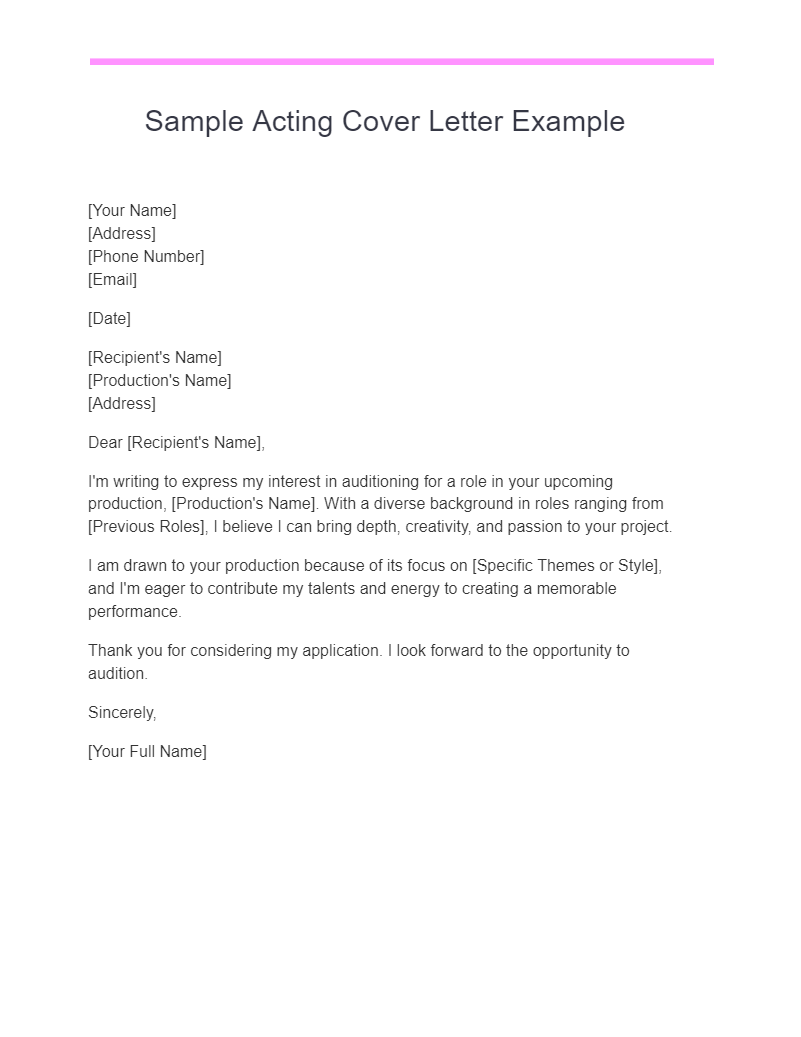
Cover Letter for Acting Agent Example
When seeking representation from an acting agent, the cover letter should highlight your portfolio and what you can offer. Here’s an example:
I am seeking representation and believe that your agency’s reputation for nurturing talent aligns with my career goals. My portfolio includes roles such as [Specific Roles], and I have received accolades like [Awards or Recognition].
I am committed to further developing my craft and eager to explore new opportunities. I believe that together, we can achieve great success.
Thank you for considering my application. I look forward to discussing how we can collaborate.
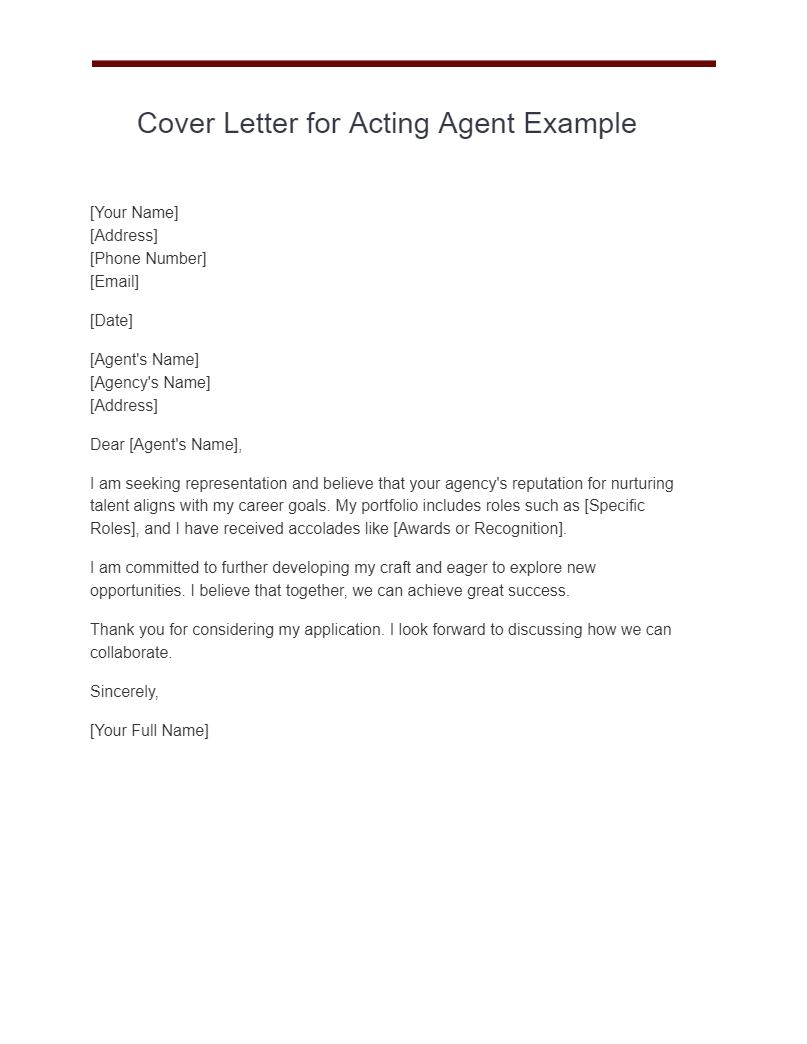
Acting Cover Letter for Male Actor Example
A cover letter for a male actor should emphasize relevant experience and suitability for a particular role. Here’s an example:
I’m writing to apply for the role of [Character’s Name] in [Production’s Name]. With my experience in roles such as [Previous Roles], I believe I can bring authenticity, depth, and dynamism to this character.
I appreciate your production’s commitment to [Specific Themes or Style], and I’m eager to contribute my skills to create a compelling performance.
Thank you for considering my application. I look forward to auditioning for this role.
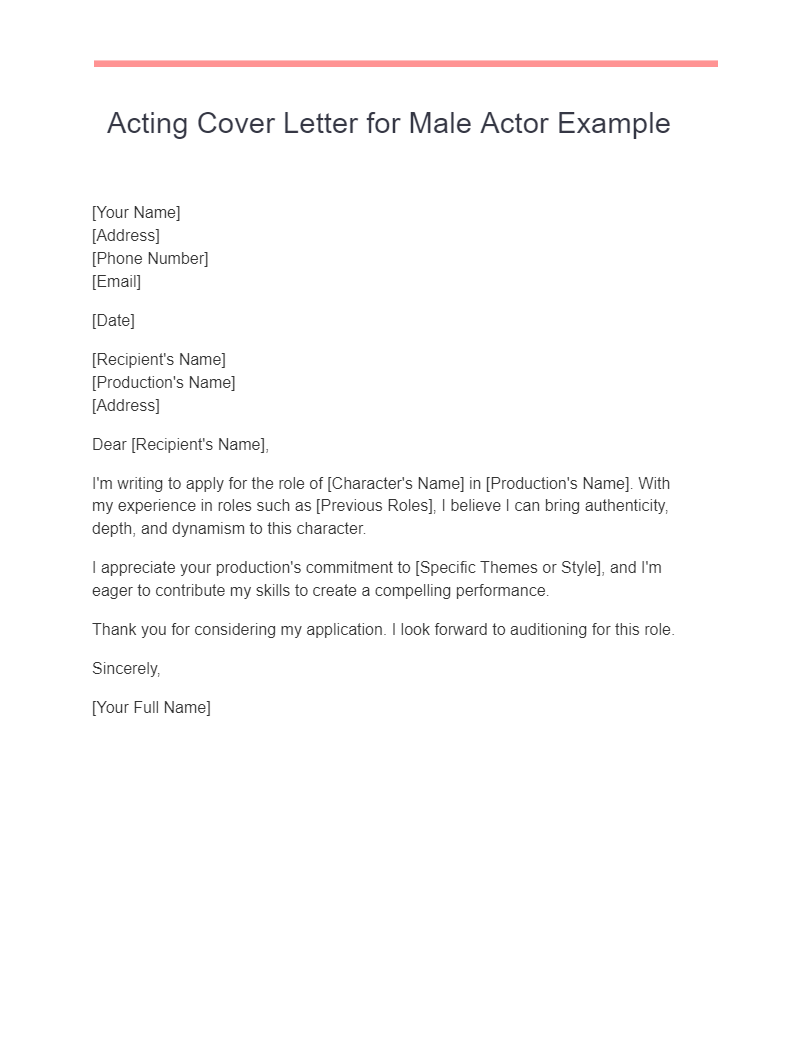
Acting Cover Letter Female Actor Example
A cover letter for a female actor should highlight relevant experience and enthusiasm for a specific role. Here’s an example:
I am excited to apply for the role of [Character’s Name] in [Production’s Name]. With my experience in roles such as [Previous Roles], I am confident in my ability to bring depth, nuance, and creativity to this character.
Your production’s exploration of [Specific Themes or Style] resonates with me, and I look forward to contributing my talents to your project.
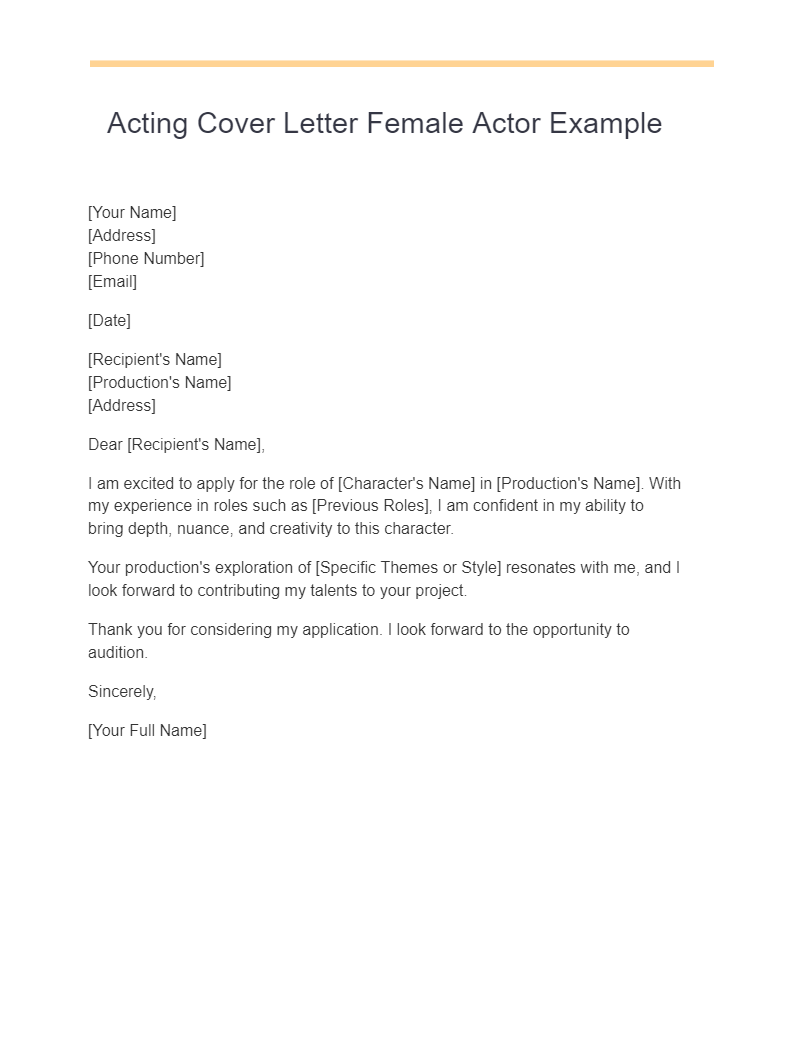
Acting Cover Letter for Child Actor Example
When applying on behalf of a child actor, the cover letter should highlight the child’s experience, suitability for the role, and parental consent. Here’s an example:
[Parent/Guardian Name] [Address] [Phone Number] [Email]
I am writing on behalf of my child, [Child’s Name], to apply for the role of [Character’s Name] in [Production’s Name]. With experience in roles such as [Previous Roles], [Child’s Name] has demonstrated talent, professionalism, and enthusiasm for acting.
I fully support [Child’s Name]’s interest in this role and believe that [he/she] can contribute positively to your production. Enclosed are the necessary permissions and documentation.
Thank you for considering [Child’s Name] for this opportunity. We look forward to the audition.
Sincerely, [Parent/Guardian Full Name]
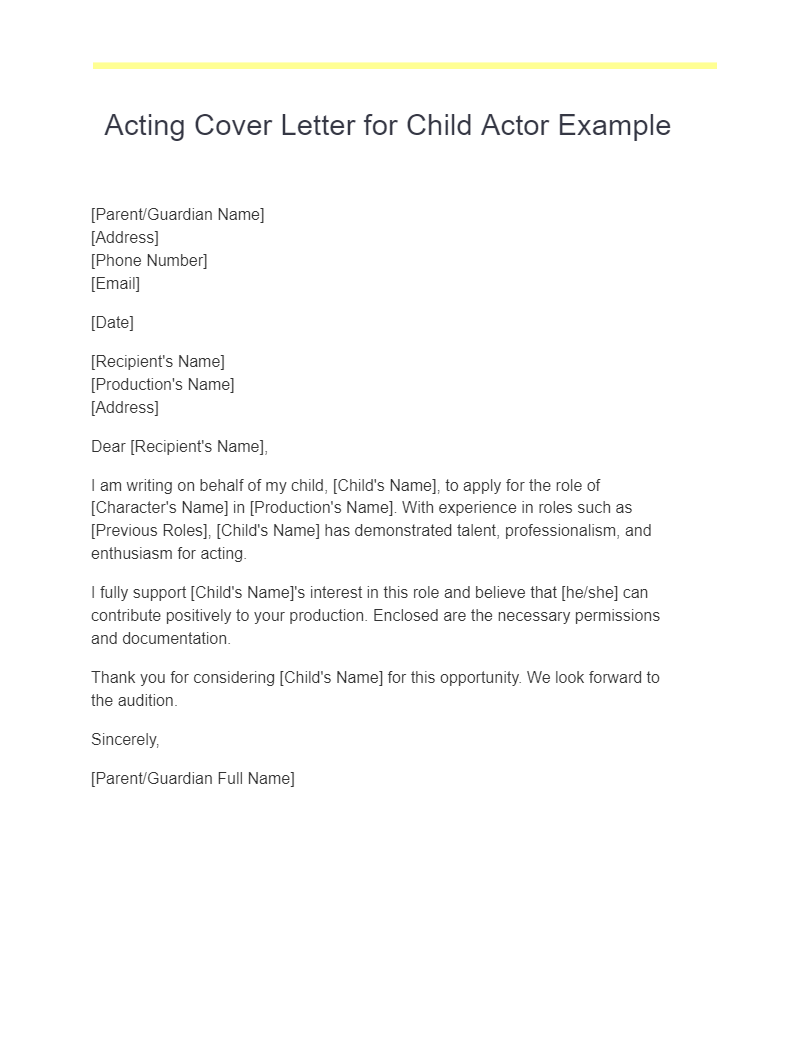
First Time Acting Cover Letter Example
For someone new to acting, the cover letter should emphasize enthusiasm, transferable skills, and alignment with the role. Here’s an example:
While I may be new to professional acting, I am eager to pursue my passion and apply for the role of [Character’s Name] in [Production’s Name]. My background in [Related Field or Hobby] has given me skills that I believe are transferable to acting, such as [Specific Skills].
I am drawn to your production’s focus on [Specific Themes or Style] and am committed to learning, growing, and contributing my energy to this exciting project.
Thank you for considering my application. I look forward to the opportunity to audition and learn from this experience.
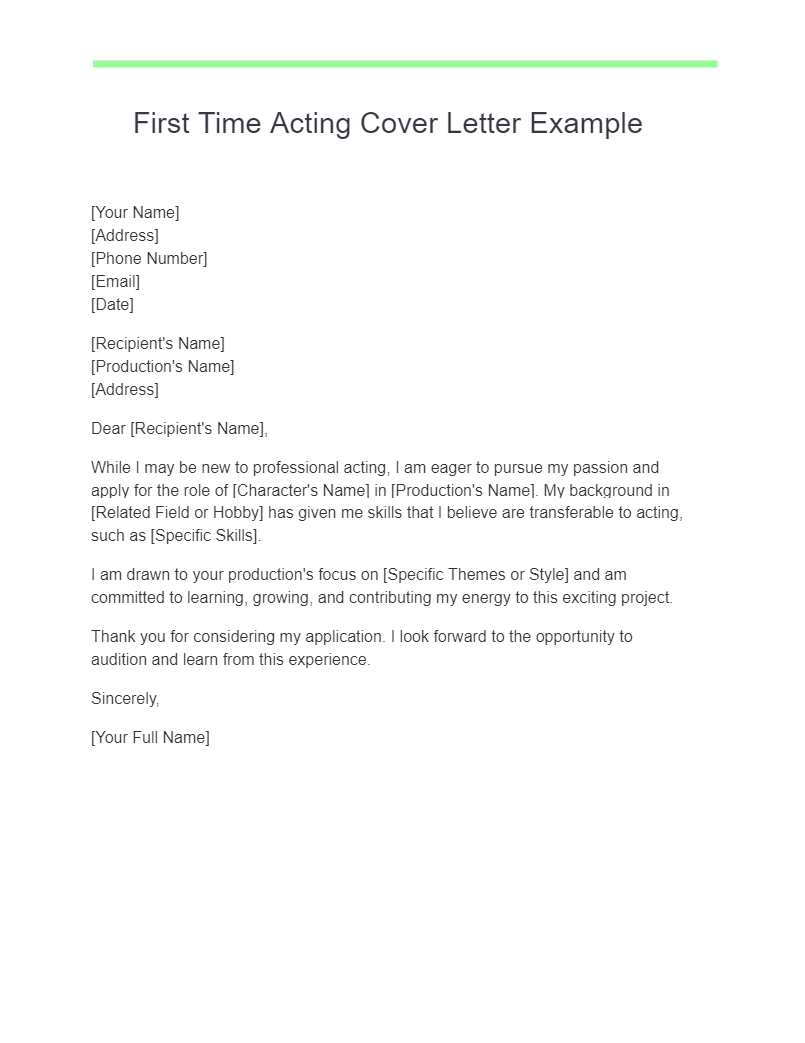
Artist Cover Letter Example
When applying for a role that requires artistic skills in addition to acting, a cover letter should showcase both sets of talents. Here’s an example:
I am excited to apply for the role of [Character’s Name] in [Production’s Name], which combines my passions for acting and [Specific Art Form]. With experience in both fields, including [Previous Roles and Artistic Achievements], I believe I can bring a unique perspective and creativity to this role.
Your production’s integration of art and storytelling resonates with me, and I am eager to contribute my diverse talents to your project.
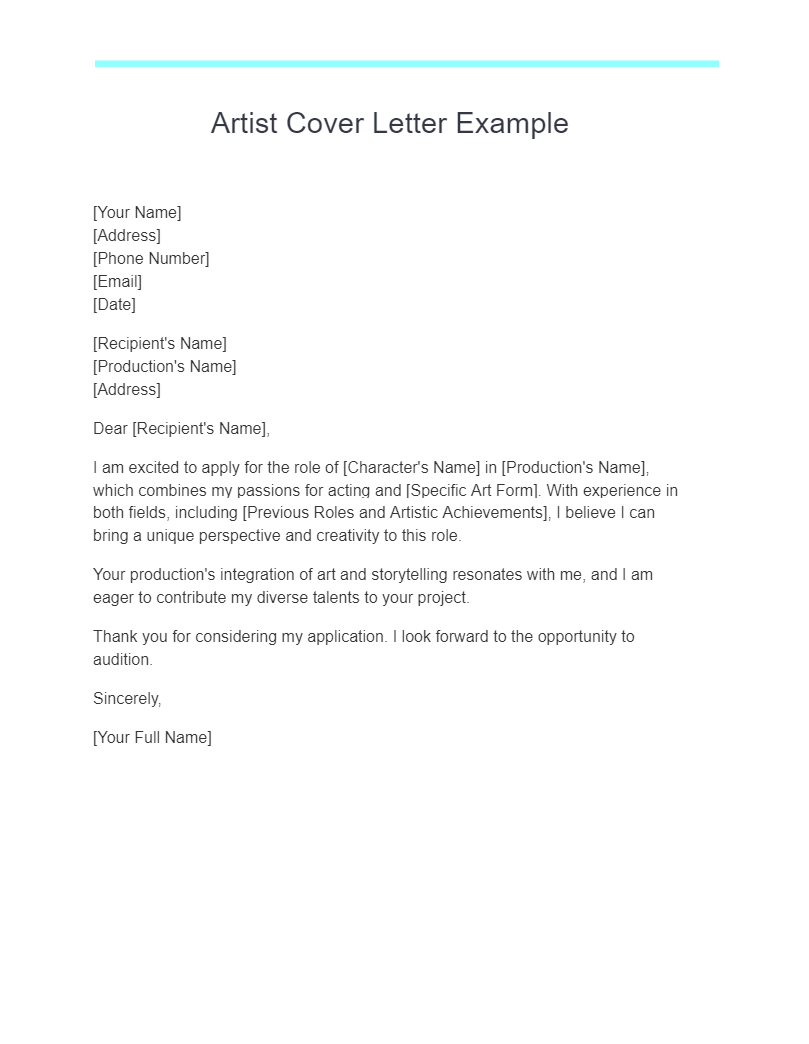
Acting Cover Letter for Interview Example
When invited for an interview or audition, the cover letter should express gratitude and eagerness. Here’s an example:
Thank you for inviting me to audition for the role of [Character’s Name] in [Production’s Name]. I am honored by the opportunity and eagerly look forward to demonstrating my skills and discussing how I can contribute to your project.
Your production’s emphasis on [Specific Themes or Style] aligns with my artistic vision
, and I am excited to explore this creative collaboration.
I appreciate your consideration and look forward to meeting you on [Date of Audition/Interview].
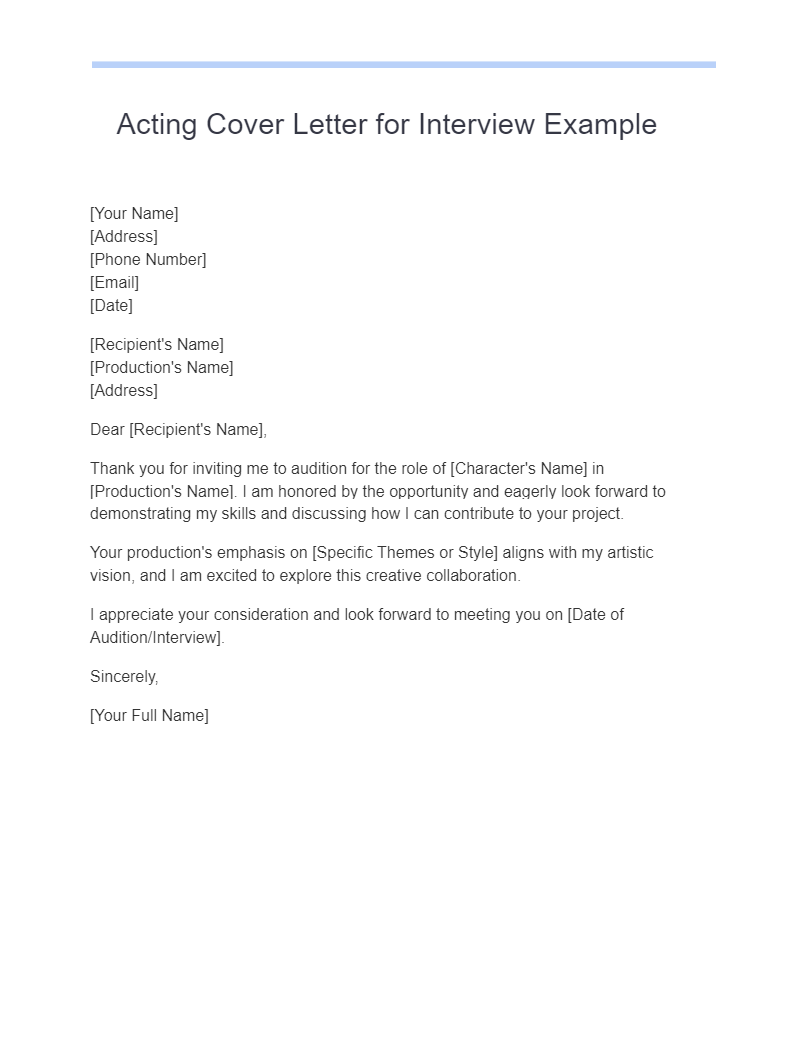
Background Actor Cover Letter Example
Background actors play vital supporting roles, and a cover letter should emphasize willingness to contribute to the overall success of the production. Here’s an example:
I am writing to apply for a background actor role in [Production’s Name]. With experience in [Previous Roles as a Background Actor], I understand the importance of this role in creating a believable and engaging setting.
I am committed to professionalism, punctuality, and contributing to the overall success of your production. Your focus on [Specific Themes or Style] resonates with me, and I’m eager to be part of your team.
Thank you for considering my application. I look forward to the opportunity to contribute.
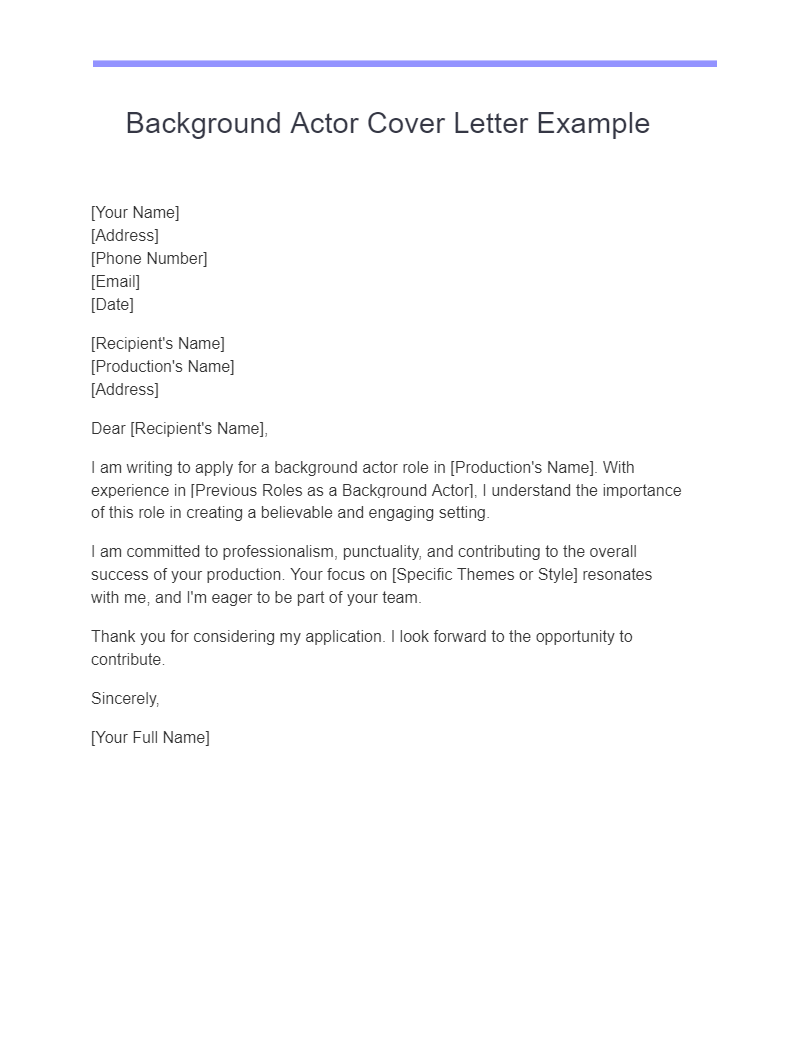
Series Regular Cover Letter Example
When applying for a series regular role, the cover letter should highlight relevant experience, alignment with the character, and commitment to a long-term project. Here’s an example:
I am excited to apply for the series regular role of [Character’s Name] in [Production’s Name]. With experience in [Previous Long-term Roles], I understand the dedication and continuity required for this position.
Your series’ exploration of [Specific Themes or Style] aligns with my interests, and I believe I can bring depth, consistency, and creativity to this character over the long term.
Thank you for considering my application. I look forward to the opportunity to audition and discuss how I can fit into this exciting project.
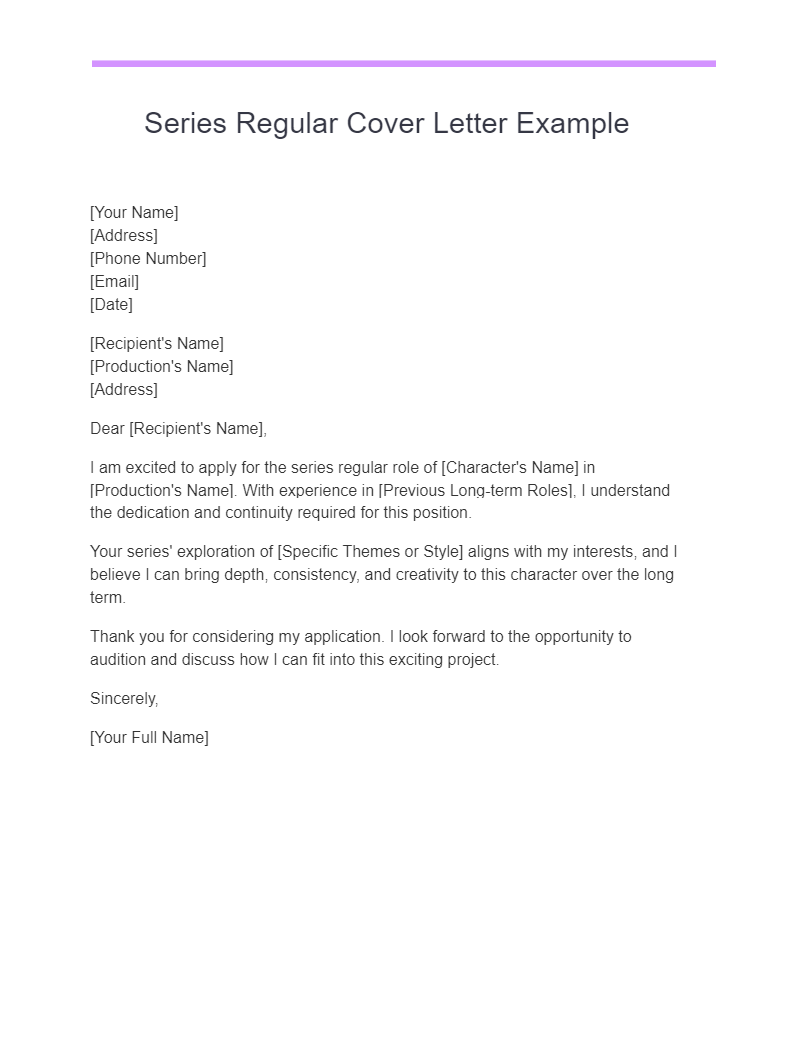
Co-star/Day Player Cover Letter Example
Applying for a co-star or day player role requires highlighting adaptability and readiness to contribute to a specific scene or episode. Here’s an example:
I am writing to apply for the co-star/day player role of [Character’s Name] in [Episode/Scene of Production’s Name]. With experience in [Previous Co-star/Day Player Roles], I am confident in my ability to adapt, collaborate, and deliver a strong performance.
Your production’s focus on [Specific Themes or Style] resonates with me, and I am eager to contribute my skills to this specific part of your project.
Thank you for considering my application. I look forward to the opportunity to audition and work with your team.
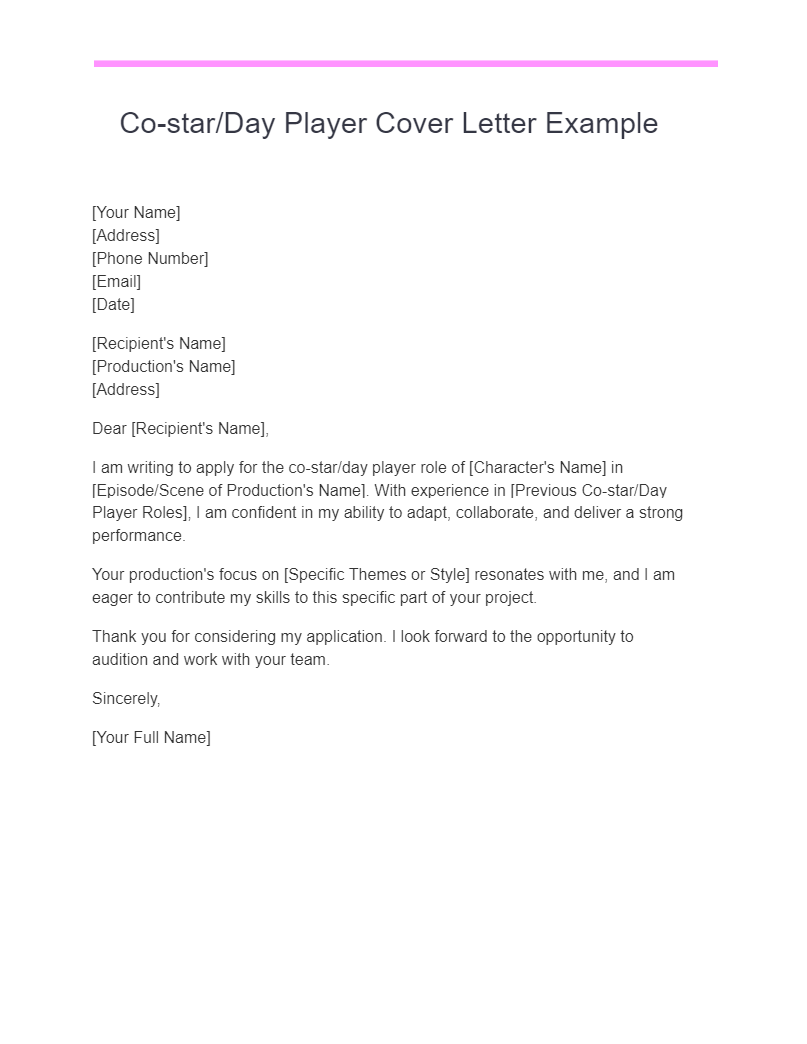
Body Double Cover Letter Example
A cover letter for a body double should emphasize physical resemblance, experience, and professionalism. Here’s an example:
I am writing to apply for the body double role for [Character’s Name/Actor’s Name] in [Production’s Name]. With a physical resemblance and experience in [Previous Body Double Roles], I believe I can effectively contribute to creating seamless visuals for this character.
I am committed to professionalism, attention to detail, and working closely with the team to achieve the desired effects.
Thank you for considering my application. I look forward to the opportunity to contribute to your production.
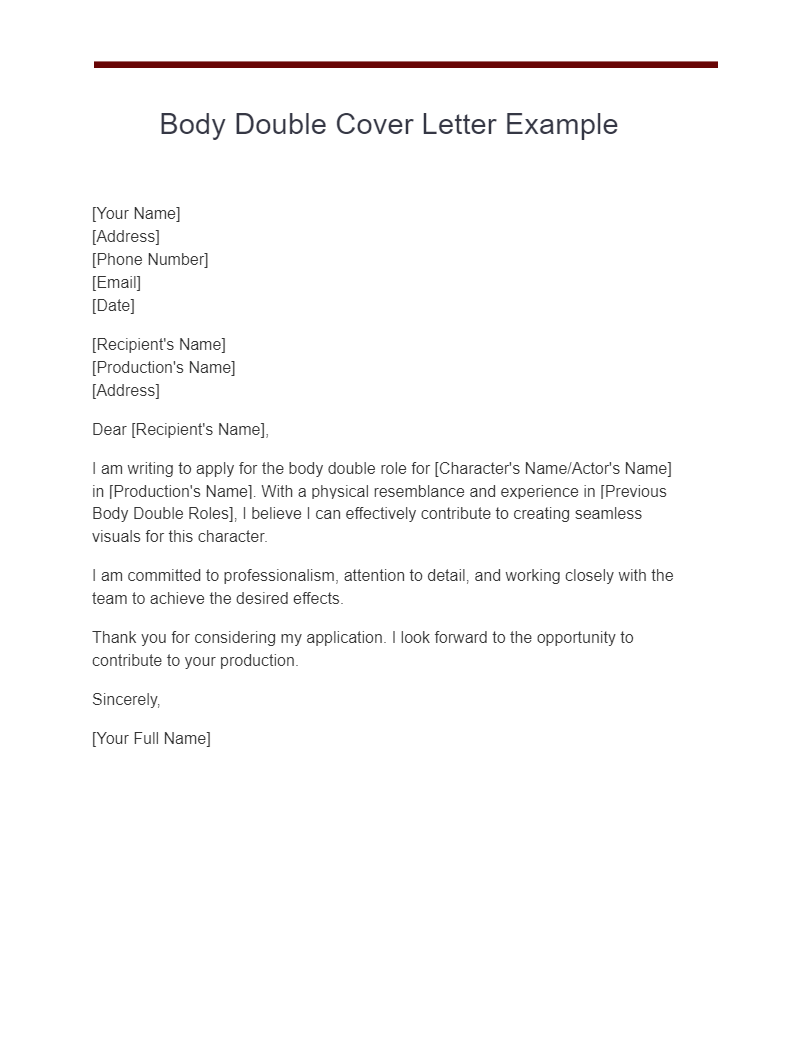
Stunt Double Cover Letter for Theater Example
When applying for a stunt double role in the theater, emphasize your relevant skills, experience, and commitment to safety. Here’s an example: [Your Name] [Address] [Phone Number] [Email]
[Recipient’s Name] [Theater’s Name] [Address]
I am excited to apply for the stunt double role for [Character’s Name/Actor’s Name] in [Theater Production’s Name]. With training in [Specific Stunt Skills] and experience in [Previous Stunt Roles], I believe I can execute the required stunts safely and convincingly.
I am committed to collaboration, safety protocols, and working closely with the director and actor to achieve the desired visual impact.
Thank you for considering my application. I look forward to the opportunity to bring my skills to your production.
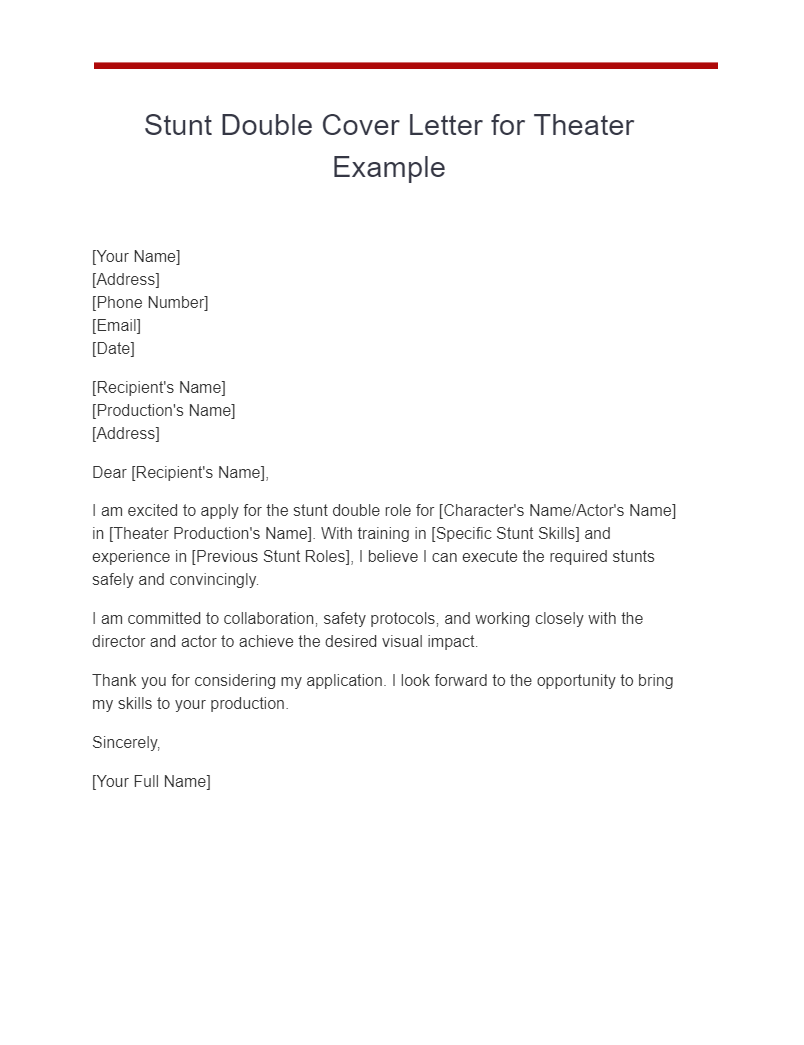
What Should a Cover Letter Say for Acting?
An acting cover letter should be tailored to the specific role and production. It must include your contact information, the recipient’s details, a formal greeting, an introduction, a body highlighting your qualifications and alignment with the role, a closing statement expressing gratitude, and a formal sign-off.
How Do You Write a Cover Letter for Acting?
1. Identify the Role and Production: Tailor your letter to the specific character, project, or agency. 2. Highlight Relevant Experience: Mention previous acting roles, training, or related experiences. 3. Express Alignment with the Role: Explain why you are drawn to the character or production’s themes. 4. Show Professionalism: Use a formal tone, clear language, and proper formatting. 5. Include Contact Information: Ensure that casting directors or agents can easily reach you. 6. Express Gratitude: Thank the recipient for considering your application. 7. Proofread: Check for grammar and spelling errors.
Tips for an Acting Cover Letter
When crafting an acting cover letter, consider these specific tips: 1. Do Your Research: Understand the production, director, and character. Tailor your letter to show that you’ve done your homework. 2. Be Concise but Detailed: Focus on what makes you a fit for this particular role. Mention specific skills or experiences that relate to the character or production. 3. Use a Professional Tone: Maintain a formal and respectful tone throughout. 4. Show Your Passion: Convey your enthusiasm for the role and the production’s themes or style. 5. Provide Accurate Contact Information: Make it easy for them to reach you. 6. Follow Submission Guidelines: If there are specific guidelines for submitting your cover letter, follow them precisely. 7. Proofread: Errors can make a poor impression; ensure your letter is free of typos and grammatical mistakes.
How Long Should an Acting Cover Letter Be?
An acting cover letter should typically be one page in length. It should be concise enough to read quickly but detailed enough to demonstrate your suitability and enthusiasm for the role. Always prioritize quality and relevance over quantity.
Crafting a thoughtful and targeted acting cover letter can make a significant difference in your pursuit of acting roles. From background actors to lead roles, a well-written cover letter can help you stand out and convey your passion and alignment with the character and production. Remember to tailor each cover letter to the specific role, show your understanding of the production, highlight your relevant experiences, and maintain a professional tone. By doing so, you increase your chances of capturing the attention of casting directors, producers, and agents.
Cover Letter Maker
Text prompt
- Instructive
- Professional
Write a cover letter for a college student applying for an internship at an educational technology company
Form a cover letter for a high school student seeking a part-time job at a local bookstore.

How to Write a Cover Letter: A Comprehensive Guide with Examples (2024)
Crafting a compelling cover letter is the first step towards landing an interview. It’s usually the first impression an employer gets before even seeing your resume, and it will help to set the tone and establish your personality before getting into your qualifications and suitability for the position.
Whether you're applying for a job, internship, or generally submitting your resume for consideration, understanding how to write a cover letter can significantly enhance your chances of success.
What is a Cover Letter?
A cover letter is a formal document accompanying your resume that introduces yourself to potential employers, highlighting your qualifications, experiences, and interest in a specific job or internship. It offers you the opportunity to showcase your personality and passion for the role in a more personalized manner than a resume alone.
Cover Letter Format
The format of a cover letter typically follows a standard business letter structure. It includes your contact information, the date, the recipient's contact details, a salutation, body paragraphs, and a closing. Ensure that your cover letter is concise, well-organized, and visually appealing, using a professional font and maintaining consistent formatting throughout.
As your cover letter will often be sent as an email, check this guide on how to write an email for some general tips on subject lines, email greetings, structuring the main content, and signing off.
Cover Letter for a Job
When applying for a job, a cover letter for your resume is often expected, and it serves as your initial introduction to potential employers. It should be customized for each position, showcasing how your skills and experiences fit the job requirements. A well-crafted cover letter can distinguish you from other applicants and increase your chances of securing an interview, especially if you can show that you’re genuinely aligned with the company’s goals.
Cover Letter for an Internship
For internship applications, a cover letter is equally essential. It allows you to convey your enthusiasm for the opportunity, relevant skills, and willingness to learn. Even if you have limited professional experience, your cover letter can highlight academic achievements, extracurricular activities, and relevant coursework that demonstrate your potential value to the organization.
Writing a Cover Letter
Let’s get into how to write a cover letter, step by step:
Step 1: How to Address a Cover Letter
When addressing your cover letter, it's essential to find out the name and title of the hiring manager or recruiter whenever possible. Addressing the letter to a specific individual adds a personal touch and demonstrates your initiative. A quick note on how to address a cover letter without a name. If you're unable to identify the recipient, you can use a general greeting such as "Dear Hiring Manager" or "Dear [Company Name] Recruiting Team."
Step 2: What to Include in a Cover Letter
Writing a compelling cover letter requires careful attention to detail and a strategic approach. Begin by thoroughly researching the company and the position to tailor your letter accordingly. Highlight your most relevant experiences and accomplishments, using specific examples to demonstrate your qualifications. Keep your language professional, yet engaging, and avoid using generic templates or clichés. Instead, strive to make a memorable impression that sets you apart from other candidates by showing you understand what the company is about.
Structure-wise, a well-written cover letter should include the following elements:
Introduction : Start by stating the position you're applying for and how you learned about it. Express your enthusiasm for the opportunity and briefly introduce yourself.
Body Paragraphs : Use one or two paragraphs to highlight your relevant experiences, skills, and achievements. Provide specific examples that demonstrate your qualifications and fit for the role. Tailor your content to align with the job description and company's needs.
Closing Paragraph : Summarize your interest in the position and reiterate your enthusiasm for the opportunity. Thank the employer for considering your application and express your willingness to discuss further in an interview.
Closing : End your cover letter with a professional closing, such as "Sincerely" or "Best regards," followed by your name and contact information.
By using this kind of cover letter template, you can keep a clear and structured approach whilst also easily adjusting your content each time to customize it for each specific contact.
Before you send
Remember maintain professionalism throughout and always proofread your cover letter before you send it off. Check this quick list of cover letter dos and don’ts so you can ensure you’ve done everything you can and haven’t made any glaring errors along the way.
Note for students: While it may be reasonable to apply for internships with your university email, it probably won’t come across as particularly professional for proper job applications. Contacting an employer from a free email account with a funny name you made when you were an adolescent also won’t be particularly impressive. You may want to use a service like Inbox.com and create a business email account that shows you’re a serious professional.
Cover letter examples
Here are some short cover letter samples that you can use as templates for your own letter. Note that although the content should be adapted both to you and to the company you’re applying to, a similar structure applies in all cases.
1. Marketing Manager Cover Letter:
Dear [Hiring Manager's Name],
I am writing to express my interest in the Marketing Manager position at [Company Name], as advertised on [where you found the job posting]. With over five years of experience in marketing strategy development, campaign management, and brand positioning, I am excited about the opportunity to contribute to your team and drive results for [Company Name].
In my previous role at [Previous Company], I led cross-functional teams to develop and execute innovative marketing campaigns that resulted in a 30% increase in brand awareness and a 25% boost in lead generation. My ability to analyze market trends, identify customer insights, and leverage data-driven strategies has consistently delivered impactful results and exceeded organizational objectives.
I am particularly drawn to [specific aspect of the company or job description], and I am eager to bring my expertise in digital marketing, social media management, and content development to support [Company Name]'s mission of [mention company mission or values].
Thank you for considering my application. I am enthusiastic about the possibility of joining [Company Name] and contributing to its continued success. I am available for an interview at your earliest convenience and can be reached at [Your Phone Number] or [Your Email Address].
Sincerely, [Your Name]
2. Software Engineer Cover Letter:
I am writing to apply for the Software Engineer position at [Company Name], as advertised on [where you found the job posting]. With a Bachelor's degree in Computer Science and three years of hands-on experience in software development and coding, I am excited about the opportunity to contribute to your team and develop innovative solutions for [Company Name].
In my previous role at [Previous Company], I played a key role in designing and implementing scalable software solutions that optimized workflow efficiency and enhanced user experience. My proficiency in programming languages such as Java, Python, and JavaScript, coupled with my strong problem-solving skills, has enabled me to deliver high-quality software solutions that meet and exceed client expectations.
I am impressed by [specific aspect of the company or job description], and I am eager to leverage my technical skills and passion for innovation to support [Company Name]'s goals of [mention company goals or objectives].
Thank you for considering my application. I am eager to further discuss how my background and expertise align with the needs of [Company Name] and am available for an interview at your earliest convenience. Please feel free to contact me at [Your Phone Number] or [Your Email Address] to schedule a discussion.
3. Graphic Designer Cover Letter:
I am thrilled to apply for the Graphic Designer position at [Company Name], as advertised on [where you found the job posting]. With a strong background in visual communication, brand identity development, and multimedia design, I am excited about the opportunity to bring my creativity and expertise to your team and contribute to [Company Name]'s success.
In my previous role at [Previous Company], I collaborated with cross-functional teams to create visually compelling designs that effectively communicated brand messages and engaged target audiences. My proficiency in Adobe Creative Suite, coupled with my attention to detail and passion for design, has allowed me to deliver innovative solutions that align with client objectives and exceed expectations.
I am particularly drawn to [specific aspect of the company or job description], and I am eager to leverage my design skills and artistic vision to support [Company Name]'s mission of [mention company mission or values].
Thank you for considering my application. I am enthusiastic about the possibility of joining [Company Name] and contributing to its creative endeavors. I am available for an interview at your earliest convenience and can be reached at [Your Phone Number] or [Your Email Address].
What is a cover letter for a job?
A cover letter for a job is a formal document submitted alongside a resume during the application process. It introduces the applicant to the potential employer and highlights their qualifications, experiences, and interest in the specific job position.
What is a cover letter for a resume?
A cover letter for a resume is a document that accompanies a resume when applying for a job. While the resume provides a summary of the applicant's skills and experiences, the cover letter offers additional context and insight into their suitability for the position.
What is the purpose of a cover letter?
The purpose of a cover letter is to introduce the applicant to the potential employer, showcase their qualifications and experiences, and express their interest in the job position. It allows applicants to personalize their application and demonstrate their enthusiasm and suitability for the role.
What does a cover letter look like?
A cover letter typically follows a formal business letter format, including the sender's and recipient's contact information, a salutation, body paragraphs, and a closing. It should be well-organized, concise, and visually appealing, with a professional tone and consistent formatting.
How long should a cover letter be?
A cover letter should be concise and to the point, typically no longer than one page. It should provide enough information to highlight the applicant's qualifications and interest in the position without overwhelming the reader with unnecessary details.
What should be in a cover letter?
A cover letter should include the sender's and recipient's contact information, a formal salutation, an introduction stating the position being applied for and how the applicant learned about it, body paragraphs highlighting relevant qualifications and experiences, and a closing expressing gratitude and interest in further discussion.
How to Start a Cover Letter
To start your cover letter effectively, consider using a strong opening sentence or attention-grabbing statement that immediately captures the reader's interest. You can mention a mutual connection, reference a recent company accomplishment, or highlight a specific aspect of the job that excites you.
How to End a Cover Letter
Ending your cover letter on a high note is crucial to leave a lasting impression. In the closing paragraph, reiterate your interest in the position and express your gratitude for the opportunity to apply. Convey confidence in your ability to contribute to the company's success. Finally, use a professional closing, such as "Sincerely" or "Best regards," followed by your name.
Updated: April 10, 2024 at 4:33 PM
Published: April 10, 2024 at 4:33 PM
You might also like
What is the difference between cc and bcc.
Unravel the nuances between CC (Carbon Copy) and BCC (Blind Carbon Copy) in emails through an insightful exploration of their meanings and distinctive functions.
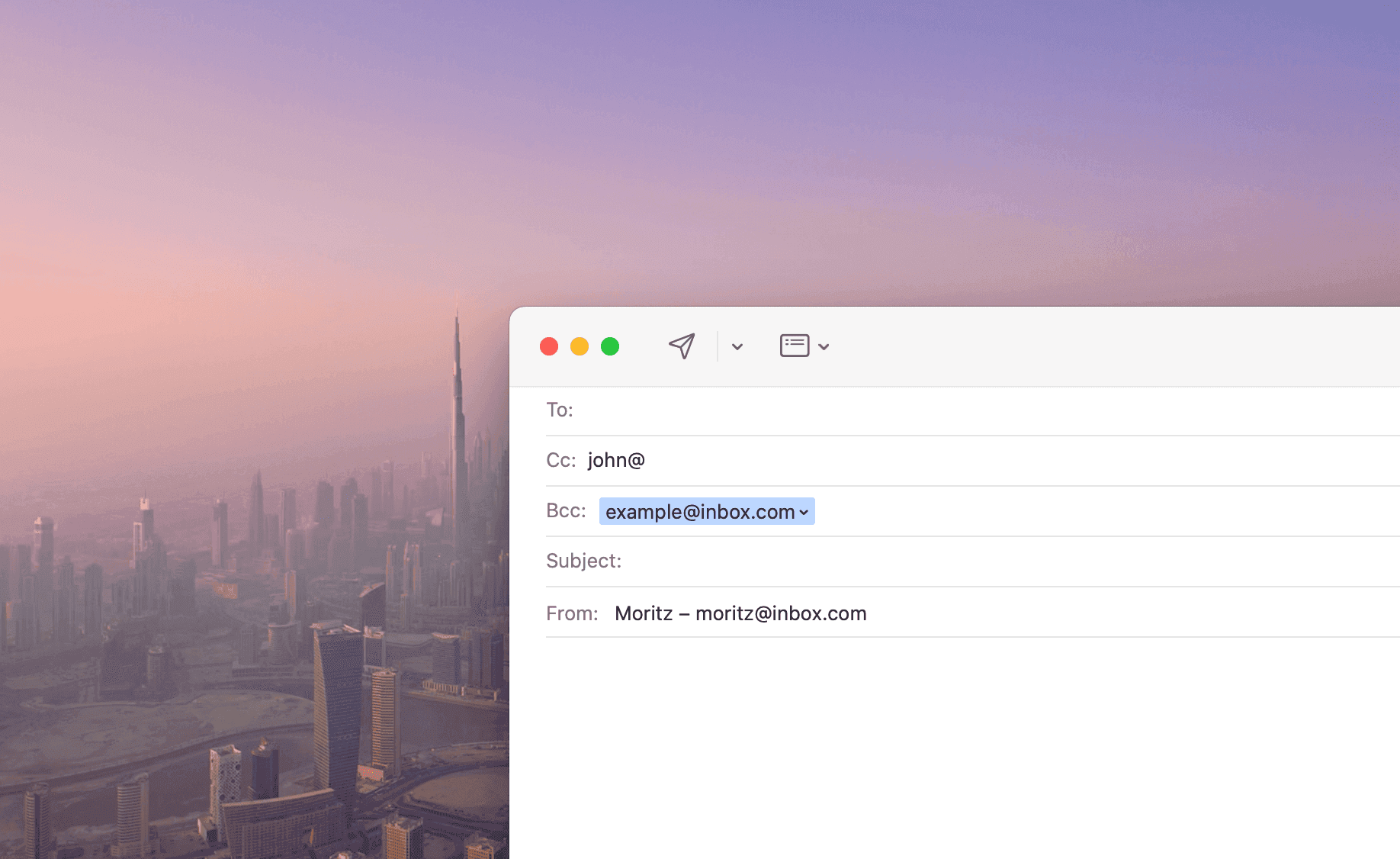
Jan 4, 2024, 1:56 PM
The Do's and Don’ts of Email Attachments
Master the art of email attachments with our expert guide on the essential dos and don’ts, ensuring secure and efficient digital communication.

Dec 8, 2023, 12:13 AM
How to Write a Cover Letter [Full Guide & Examples for 2024]

After weeks of heavy job searching, you’re almost there!
You’ve perfected your resume.
You’ve short-listed the coolest jobs you want to apply for.
You’ve even had a friend train you for every single interview question out there.
But then, before you can send in your application and call it a day, you remember that you need to write a cover letter too.
So now, you’re stuck staring at a blank page, wondering where to start...
Don’t panic! We’ve got you covered. Writing a cover letter is a lot simpler than you might think.
In this guide, we’re going to teach you how to write a cover letter that gets you the job you deserve.
We're going to cover:
What Is a Cover Letter?
- How to Write the Perfect Cover Letter, Step by Step
- 15+ Job-Winning Cover Letter Examples
Let’s get started.
A cover letter is a document that you submit as part of your job application, alongside your resume or CV.
The purpose of a cover letter is to introduce you and briefly summarize your professional background. On average, it should be around 250 to 400 words long .
A good cover letter is supposed to impress the hiring manager and convince them you’re worth interviewing as a candidate.
So, how can your cover letter achieve this?
First of all, it should complement your resume, not copy it. Your cover letter is your chance to elaborate on important achievements, skills, or anything else that your resume doesn’t give you the space to cover.
For example, if you have an employment gap on your resume, the cover letter is a great place to explain why it happened and how it helped you grow as a person.
If this is your first time writing a cover letter, writing about yourself might seem complicated. But don’t worry—you don’t need to be super creative or even a good writer .
All you have to do is follow this tried and tested cover letter structure:

- Header. Add all the necessary contact information at the top of your cover letter.
- Formal greeting. Choose an appropriate way to greet your target audience.
- Introduction. Introduce yourself in the opening paragraph and explain your interest in the role.
- Body. Elaborate on why you’re the best candidate for the job and a good match for the company. Focus on “selling” your skills, achievements, and relevant professional experiences.
- Conclusion. Summarize your key points and wrap it up professionally.
Now, let’s take a look at an example of a cover letter that follows our structure perfectly:

New to cover letter writing? Give our cover letter video a watch before diving into the article!
When Should You Write a Cover Letter?
You should always include a cover letter in your job application, even if the hiring manager never reads it. Submitting a cover letter is as important as submitting a resume if you want to look like a serious candidate.
If the employer requests a cover letter as part of the screening process, not sending one is a huge red flag and will probably get your application tossed into the “no” pile immediately.
On the other hand, if the job advertisement doesn’t require a cover letter from the candidates, adding one shows you went the extra mile.
Putting in the effort to write a cover letter can set you apart from other candidates with similar professional experience and skills, and it could even sway the hiring manager to call you for an interview if you do it right.
Need to write a letter to help get you into a good school or volunteer program? Check out our guide to learn how to write a motivation letter !
How to Write the Perfect Cover Letter
Now that you know what a cover letter is, it’s time to learn how to write one!
We’ll go through the process in detail, step by step.
#1. Choose the Right Cover Letter Template
A good cover letter is all about leaving the right first impression.
So, what’s a better way to leave a good impression than a well-formatted, stylish template?

Just choose one of our hand-picked cover letter templates , and you’ll be all set in no time!
As a bonus, our intuitive AI will even give you suggestions on how to improve your cover letter as you write it. You’ll have the perfect cover letter done in minutes!

#2. Put Contact Information in the Header
As with a resume, it’s important to
start your cover letter
with your contact details at the top. These should be in your cover letter’s header, separated neatly from the bulk of your text.

Here, you want to include all the essential contact information , including:
- Full Name. Your first and last name should stand out at the top.
- Job Title. Match the professional title underneath your name to the exact job title of the position you’re applying for. Hiring managers often hire for several roles at once, so giving them this cue about what role you’re after helps things go smoother.
- Email Address. Always use a professional and easy-to-spell email address. Ideally, it should combine your first and last names.
- Phone Number. Add a number where the hiring manager can easily reach you.
- Location. Add your city and state/country, no need for more details.
- Relevant Links (optional). You can add links to websites or social media profiles that are relevant to your field. Examples include a LinkedIn profile , Github, or an online portfolio.
Then it’s time to add the recipient’s contact details, such as:
- Hiring Manager's Name. If you can find the name of the hiring manager, add it.
- Hiring Manager's Title. While there’s no harm in writing “hiring manager,” if they’re the head of the department, we recommend you use that title accordingly.
- Company Name. Make sure to write the name of the company you're applying to.
- Location. The city and state/country are usually enough information here, too.
- Date of Writing (Optional). You can include the date you wrote your cover letter for an extra professional touch.

#3. Address the Hiring Manager
Once you’ve properly listed all the contact information, it’s time to start writing the content of the cover letter.
The first thing you need to do here is to address your cover letter directly to the hiring manager.
In fact, you want to address the hiring manager personally .
Forget the old “Dear Sir or Madam” or the impersonal “To Whom It May Concern.” You want to give your future boss a good impression and show them that you did your research before sending in your application.
No one wants to hire a job seeker who just spams 20+ companies and hopes something sticks with their generic approach
So, how do you find out who’s the hiring manager?
First, check the job ad. The hiring manager’s name might be listed somewhere in it.
If that doesn’t work, check the company’s LinkedIn page. You just need to look up the head of the relevant department you’re applying to, and you’re all set.
For example, if you’re applying for the position of Communication Specialist at Novorésumé. The hiring manager is probably the Head of Communications or the Chief Communications Officer.
Here’s what you should look for on LinkedIn:

And there you go! You have your hiring manager.
But let’s say you’re applying for a position as a server . In that case, you’d be looking for the “restaurant manager” or “food and beverage manager.”
If the results don’t come up with anything, try checking out the “Team” page on the company website; there’s a good chance you’ll at least find the right person there.
Make sure to address them as Mr. or Ms., followed by their last name. If you’re not sure about their gender or marital status, you can just stick to their full name, like so:
- Dear Mr. Kurtuy,
- Dear Andrei Kurtuy,
But what if you still can’t find the hiring manager’s name, no matter where you look?
No worries. You can direct your cover letter to the company, department, or team as a whole, or just skip the hiring manager’s name.
- Dear [Department] Hiring Manager
- Dear Hiring Manager
- Dear [Department] Team
- Dear [Company Name]
Are you applying for a research position? Learn how to write an academic personal statement .
#4. Write an Eye-Catching Introduction
First impressions matter, especially when it comes to your job search.
Hiring managers get hundreds, sometimes even thousands, of applications. Chances are, they’re not going to be reading every single cover letter end-to-end.
So, it’s essential to catch their attention from the very first paragraph.
The biggest problem with most opening paragraphs is that they’re usually extremely generic. Here’s an example:
- My name is Jonathan, and I’d like to work as a Sales Manager at XYZ Inc. I’ve worked as a Sales Manager at MadeUpCompany Inc. for 5+ years, so I believe that I’d be a good fit for the position.
See the issue here? This opening paragraph doesn’t say anything except the fact that you’ve worked the job before.
And do you know who else has similar work experience? All the other applicants you’re competing with.
Instead, you want to start with some of your top achievements to grab the reader’s attention. And to get the point across, the achievements should be as relevant as possible to the position.
Your opening paragraph should also show the hiring manager a bit about why you want this specific job. For example, mention how the job relates to your plans for the future or how it can help you grow professionally. This will show the hiring manager that you’re not just applying left and right—you’re actually enthusiastic about getting this particular role.
Now, let’s make our previous example shine:
Dear Mr. Smith,
My name’s Michael, and I’d like to help XYZ Inc. hit and exceed its sales goals as a Sales Manager. I’ve worked as a Sales Representative with Company X, another fin-tech company , for 3+ years, where I generated an average of $30,000+ in sales per month and beat the KPIs by around 40%. I believe that my previous industry experience, passion for finance , and excellence in sales make me the right candidate for the job.
The second candidate starts with what they can do for the company in the future and immediately lists an impressive and relevant achievement. Since they’re experienced in the same industry and interested in finance, the hiring manager can see they’re not just a random applicant.
From this introduction, it’s safe to say that the hiring manager would read the rest of this candidate’s cover letter.
#5. Use the Cover Letter Body for Details
The next part of your cover letter is where you can go into detail about what sets you apart as a qualified candidate for the job.
The main thing you need to remember here is that you shouldn’t make it all about yourself . Your cover letter is supposed to show the hiring manager how you relate to the job and the company you’re applying to.
No matter how cool you make yourself sound in your cover letter, if you don’t tailor it to match what the hiring manager is looking for, you’re not getting an interview.
To get this right, use the job ad as a reference when writing your cover letter. Make sure to highlight skills and achievements that match the job requirements, and you’re good to go.
Since this part of your cover letter is by far the longest, you should split it into at least two paragraphs.
Here’s what each paragraph should cover:
Explain Why You’re the Perfect Candidate for the Role
Before you can show the hiring manager that you’re exactly what they’ve been looking for, you need to know what it is they’re looking for.
Start by doing a bit of research. Learn what the most important skills and responsibilities of the role are according to the job ad, and focus on any relevant experience you have that matches them.
For example, if you’re applying for the position of a Facebook Advertiser. The top requirements on the job ad are:
- Experience managing a Facebook ad budget of $10,000+ / month
- Some skills in advertising on other platforms (Google Search + Twitter)
- Excellent copywriting skills
So, in the body of your cover letter, you need to show how you meet these requirements. Here’s an example of what that can look like:
In my previous role as a Facebook Marketing Expert at XYZ Inc. I handled customer acquisition through ads, managing a monthly Facebook ad budget of $40,000+ . As the sole digital marketer at the company, I managed the ad creation and management process end-to-end. I created the ad copy and images, picked the targeting, ran optimization trials, and so on.
Other than Facebook advertising, I’ve also delved into other online PPC channels, including:
- Google Search
Our example addresses all the necessary requirements and shows off the candidate’s relevant skills.
Are you a student applying for your first internship? Learn how to write an internship cover letter with our dedicated guide.
Explain Why You’re a Good Fit for the Company
As skilled and experienced as you may be, that’s not all the hiring manager is looking for.
They also want someone who’s a good fit for their company and who actually wants to work there.
Employees who don’t fit in with the company culture are likely to quit sooner or later. This ends up costing the company a ton of money, up to 50% of the employee’s annual salary , so hiring managers vet candidates very carefully to avoid this scenario.
So, you have to convince the hiring manager that you’re passionate about working with them.
Start by doing some research about the company. You want to know things like:
- What’s the company’s business model?
- What’s the company’s product or service? Have you used it?
- What’s the company’s culture like?
Chances are, you’ll find all the information you need either on the company website or on job-search websites like Jobscan or Glassdoor.
Then, pick your favorite thing about the company and talk about it in your cover letter.
But don’t just describe the company in its own words just to flatter them. Be super specific—the hiring manager can see through any fluff.
For example, if you’re passionate about their product and you like the company’s culture of innovation and independent work model, you can write something like:
I’ve personally used the XYZ Smartphone, and I believe that it’s the most innovative tech I’ve used in years. The features, such as Made-Up-Feature #1 and Made-Up-Feature #2, were real game changers for the device.
I really admire how Company XYZ strives for excellence in all its product lines, creating market-leading tech. As someone who thrives in a self-driven environment, I truly believe that I’ll be a great match for your Product Design team.
So, make sure to do your fair share of research and come up with good reasons why you're applying to that specific company.
Is the company you want to work for not hiring at the moment? Check out our guide to writing a letter of interest .
#6. Wrap It Up and Sign It
Finally, it’s time to conclude your cover letter.
In the final paragraph, you want to:
- Wrap up any points you couldn't make in the previous paragraphs. Do you have anything left to say? If there’s any other information that could help the hiring manager make their decision, mention it here. If not, just recap your key selling points so far, such as key skills and expertise.
- Express gratitude. Politely thanking the hiring manager for their time is always a good idea.
- Finish the cover letter with a call to action. The very last sentence in your cover letter should be a call to action. This means you should ask the hiring manager to do something, like call you and discuss your application or arrange an interview.
- Remember to sign your cover letter. Just add a formal closing line and sign your name at the bottom.
Here’s an example of how to end your cover letter :
I hope to help Company X make the most of their Facebook marketing initiatives. I'd love to further discuss how my previous success at XYZ Inc. can help you achieve your Facebook marketing goals. Please don’t hesitate to reach out to me at the provided email address or phone number so that we may arrange an interview.
Thank you for your consideration,
Alice Richards
Feel free to use one of these other popular closing lines for your cover letter:
- Best Regards,
- Kind Regards,
Cover Letter Writing Checklist
Once you’re done with your cover letter, it’s time to check if it meets all industry requirements.
Give our handy cover letter writing checklist a look to make sure:
Does your cover letter heading include all essential information?
- Professional Email
- Phone Number
- Relevant Links
Do you address the right person?
- The hiring manager in the company
- Your future direct supervisor
- The company/department in general
Does your introductory paragraph grab the reader's attention?
- Did you mention some of your top achievements?
- Did you use numbers and facts to back up your experience?
- Did you convey enthusiasm for the specific role?
Do you show that you’re the right candidate for the job?
- Did you identify the core requirements for the role?
- Did you show how your experiences helped you fit the requirements perfectly?
Do you convince the hiring manager that you’re passionate about the company you’re applying to?
- Did you identify the top 3 things that you like about the company?
- Did you avoid generic reasons for explaining your interest in the company?
Did you conclude your cover letter properly?
- Did you recap your key selling points in the conclusion?
- Did you end your cover letter with a call to action?
- Did you use the right formal closing line and sign your name?
15 Cover Letter Tips
Now you’re all set to write your cover letter!
Before you start typing, here are some cover letter tips to help take your cover letter to the next level:
- Customize Your Cover Letter for Each Job. Make sure your cover letter is tailored to the job you're applying for. This shows you're not just sending generic applications left and right, and it tells the hiring manager you’re the right person for the job.
- Showcase Your Skills. Talk about how your skills meet the company’s needs. And while your hard skills should be front and center, you shouldn’t underestimate your soft skills in your cover letter either.
- Avoid Fluff. Don’t make any generic statements you can’t back up. The hiring manager can tell when you’re just throwing words around, and it doesn’t make your cover letter look good.
- Use Specific Examples. Instead of saying you're great at something, give an actual example to back up your claim. Any data you can provide makes you sound more credible, so quantify your achievements. For example, give numbers such as percentages related to your performance and the timeframe it took to accomplish certain achievements.
- Research the Company. Always take time to learn about the company you're applying to. Make sure to mention something about them in your cover letter to show the hiring manager that you're interested.
- Follow the Application Instructions. If the job posting asks for something specific in your cover letter or requires a certain format, make sure you include it. Not following instructions can come off as unattentive or signal to the hiring manager that you’re not taking the job seriously.
- Use the Right Template and Format. Choose the right cover letter format and adapt your cover letter’s look to the industry you’re applying for. For example, if you’re aiming for a job in Law or Finance, you should go for a cleaner, more professional look. But if you’re applying for a field that values innovation, like IT or Design, you have more room for creativity.
- Express Your Enthusiasm. Let the hiring manager know why you're excited about the job. Your passion for the specific role or the field in general can be a big selling point, and show them that you’re genuinely interested, not just applying left and right.
- Address Any Gaps. If there are any employment gaps in your resume , your cover letter is a great place to mention why. Your resume doesn’t give you enough space to elaborate on an employment gap, so addressing it here can set hiring managers at ease—life happens, and employers understand.
- Avoid Quirky Emails. Your email address should be presentable. It’s hard for a hiring manager to take you seriously if your email address is “[email protected].” Just use a [email protected] format.
- Check Your Contact Information. Typos in your email address or phone number can mean a missed opportunity. Double-check these before sending your application.
- Mention if You Want to Relocate. If you’re looking for a job that lets you move somewhere else, specify this in your cover letter.
- Keep It Brief. You want to keep your cover letter short and sweet. Hiring managers don’t have time to read a novel, so if you go over one page, they simply won’t read it at all.
- Use a Professional Tone. Even though a conversational tone isn’t a bad thing, remember that it's still a formal document. Show professionalism in your cover letter by keeping slang, jargon, and emojis out of it.
- Proofread Carefully. Typos and grammar mistakes are a huge deal-breaker. Use a tool like Grammarly or QuillBot to double-check your spelling and grammar, or even get a friend to check it for you.
15+ Cover Letter Examples
Need some inspiration? Check out some perfect cover letter examples for different experience levels and various professions.
5+ Cover Letter Examples by Experience
#1. college student cover letter example.

Check out our full guide to writing a college student cover letter here.
#2. Middle Management Cover Letter Example

Check out our full guide to writing a project manager cover letter here.
#3. Team Leader Cover Letter Example

Check out our full guide to writing a team leader cover letter here.
#4. Career Change Cover Letter Example

Check out our full guide to a career change resume and cover letter here.
#5. Management Cover Letter Example

Check out our full guide to writing a management cover letter here.
#6. Senior Executive Cover Letter Example

Check out our full guide to writing an executive resume here.
9+ Cover Letter Examples by Profession
#1. it cover letter example.

Check out our full guide to writing an IT cover letter here.
#2. Consultant Cover Letter Example

Check out our full guide to writing a consultant cover letter here.
#3. Human Resources Cover Letter

Check out our full guide to writing a human resources cover letter here.
#4. Business Cover Letter Example

Check out our full guide to writing a business cover letter here.
#5. Sales Cover Letter Example

Check out our full guide to writing a sales cover letter here.
#6. Social Worker Cover Letter

Check out our full guide to writing a social worker cover letter here.
#7. Lawyer Cover Letter

Check out our full guide to writing a lawyer cover letter here.
#8. Administrative Assistant Cover Letter

Check out our full guide to writing an administrative assistant cover letter here.
#9. Engineering Cover Letter Example

Check out our full guide to writing an engineer cover letter here.
#10. Receptionist Cover Letter Example

Check out our full guide to writing a receptionist cover letter here.
Need more inspiration? Check out these cover letter examples to learn what makes them stand out.

Plug & Play Cover Letter Template
Not sure how to start your cover letter? Don’t worry!
Just copy and paste our free cover letter template into the cover letter builder, and swap out the blanks for your details.
[Your Full Name]
[Your Profession]
[Your Phone Number]
[Your Email Address]
[Your Location]
[Your LinkedIn Profile URL (optional)]
[Your Personal Website URL (optional)]
[Recipient's Name, e.g., Jane Doe],
[Recipient's Position, e.g., Hiring Manager]
[Company Name, e.g., ABC Corporation]
[Company Address]
[City, State/Country]
Dear [Recipient's Name],
As a seasoned [Your Profession] with [Number of Years of Experience] years of industry experience, I am eager to express my interest in the [Job Title] position at [Company Name]. With my experience in [Your Industry/Sector] and the successes I've achieved throughout my education and career, I believe I can bring unique value and creativity to your team.
In my current role as [Your Current Job Title], I've taken the lead on more than [Number of Projects/Assignments] projects, some valued up to $[Highest Project Value]. I pride myself on consistently exceeding client expectations and have successfully [Mention a Key Achievement] in just a [Amount of Time] through [Skill] and [Skill].
I've collaborated with various professionals, such as [List Roles], ensuring that all [projects/tasks] meet [relevant standards or objectives]. This hands-on experience, coupled with my dedication to understanding each [client's/customer's] vision, has equipped me to navigate and deliver on complex projects.
My key strengths include:
- Improving [Achievement] by [%] over [Amount of Time] which resulted in [Quantified Result].
- Optimizing [Work Process/Responsibility] which saved [Previous Employer] [Amount of Time/Budget/Other Metric] over [Weeks/Months/Years]
- Spearheading team of [Number of People] to [Task] and achieving [Quantified Result].
Alongside this letter, I've attached my resume. My educational background, a [Your Degree] with a concentration in [Your Specialization], complements the practical skills that I'm particularly eager to share with [Company Name].
I'm excited about the possibility of contributing to [Something Notable About the Company or Its Mission]. I'd be grateful for the chance to delve deeper into how my expertise aligns with your needs.
Thank you for considering my application, and I look forward to hearing from you soon.
The Heart of Your Job Search - Creating a Killer Resume
Your cover letter is only as good as your resume. If either one is weak, your entire application falls through.
After all, your cover letter is meant to complement your resume. Imagine going through all this effort to leave an amazing first impression in your cover letter, only for the hiring manager to never read it because your resume was mediocre.
But don’t worry; we’ve got you covered here, too.
Check out our dedicated guide on how to make a resume and learn everything you need to know to land your dream job!
Just pick one of our resume templates and start writing your own job-winning resume.

Key Takeaways
Now that we’ve walked you through all the steps of writing a cover letter, let’s summarize everything we’ve learned:
- A cover letter is a 250 - 400 word document that’s meant to convince the hiring manager that you’re the best candidate for the job.
- Your job application should always include a cover letter alongside your resume.
- To grab the hiring manager’s attention, write a strong opening paragraph. Mention who you are, why you’re applying, and a standout achievement to pique their interest.
- Your cover letter should focus on why you’re the perfect candidate for the job and why you’re passionate about working in this specific company.
- Use the body of your cover letter to provide details on your skills, achievements, and qualifications, as well as make sure to convey your enthusiasm throughout your whole cover letter.
- Recap your key selling points towards the end of your cover letter, and end it with a formal closing line and your full name signed underneath.
At Novorésumé, we’re committed to helping you get the job you deserve every step of the way!
Follow our career blog for more valuable advice, or check out some of our top guides, such as:
- How to Make a Resume in 2024 | Beginner's Guide
- How to Write a CV (Curriculum Vitae) in 2024 [31+ Examples]
- 35+ Job Interview Questions and Answers [Full List]

To provide a safer experience, the best content and great communication, we use cookies. Learn how we use them for non-authenticated users.

How it works
Transform your enterprise with the scalable mindsets, skills, & behavior change that drive performance.
Explore how BetterUp connects to your core business systems.
We pair AI with the latest in human-centered coaching to drive powerful, lasting learning and behavior change.
Build leaders that accelerate team performance and engagement.
Unlock performance potential at scale with AI-powered curated growth journeys.
Build resilience, well-being and agility to drive performance across your entire enterprise.
Transform your business, starting with your sales leaders.
Unlock business impact from the top with executive coaching.
Foster a culture of inclusion and belonging.
Accelerate the performance and potential of your agencies and employees.
See how innovative organizations use BetterUp to build a thriving workforce.
Discover how BetterUp measurably impacts key business outcomes for organizations like yours.
A demo is the first step to transforming your business. Meet with us to develop a plan for attaining your goals.

- What is coaching?
Learn how 1:1 coaching works, who its for, and if it's right for you.
Accelerate your personal and professional growth with the expert guidance of a BetterUp Coach.
Types of Coaching
Navigate career transitions, accelerate your professional growth, and achieve your career goals with expert coaching.
Enhance your communication skills for better personal and professional relationships, with tailored coaching that focuses on your needs.
Find balance, resilience, and well-being in all areas of your life with holistic coaching designed to empower you.
Discover your perfect match : Take our 5-minute assessment and let us pair you with one of our top Coaches tailored just for you.

Research, expert insights, and resources to develop courageous leaders within your organization.
Best practices, research, and tools to fuel individual and business growth.
View on-demand BetterUp events and learn about upcoming live discussions.
The latest insights and ideas for building a high-performing workplace.
- BetterUp Briefing
The online magazine that helps you understand tomorrow's workforce trends, today.
Innovative research featured in peer-reviewed journals, press, and more.
Founded in 2022 to deepen the understanding of the intersection of well-being, purpose, and performance
We're on a mission to help everyone live with clarity, purpose, and passion.
Join us and create impactful change.
Read the buzz about BetterUp.
Meet the leadership that's passionate about empowering your workforce.
For Business
For Individuals
How to write a great cover letter in 2024: tips and structure

A cover letter is a personalized letter that introduces you to a potential employer, highlights your qualifications, and explains why you're a strong fit for a specific job.
Hate or love them, these brief documents allow job seekers to make an impression and stand out from the pile of other applications. Penning a thoughtful cover letter shows the hiring team you care about earning the position.
Here’s everything you need to know about how to write a cover letter — and a great one, at that.
What is a cover letter and why does it matter?
A professional cover letter is a one-page document you submit alongside your CV or resume as part of a job application. Typically, they’re about half a page or around 150–300 words.
An effective cover letter doesn’t just rehash your CV; it’s your chance to highlight your proudest moments, explain why you want the job, and state plainly what you bring to the table.
Show the reviewer you’re likable, talented, and will add to the company’s culture . You can refer to previous jobs and other information from your CV, but only if it helps tell a story about you and your career choices .
What 3 things should you include in a cover letter?
A well-crafted cover letter can help you stand out to potential employers. To make your cover letter shine, here are three key elements to include:
1. Personalization
Address the hiring manager or recruiter by name whenever possible. If the job posting doesn't include a name, research to find out who will be reviewing applications. Personalizing your cover letter shows that you've taken the time to tailor your application to the specific company and role.
2. Highlight relevant achievements and skills
Emphasize your most relevant skills , experiences, and accomplishments that directly relate to the job you're applying for. Provide specific examples of how your skills have benefited previous employers and how they can contribute to the prospective employer's success. Use quantifiable achievements , such as improved efficiency, cost savings, or project success, to demonstrate your impact.
3. Show enthusiasm and fit
Express your enthusiasm for the company and the position you're applying for. Explain why you are interested in this role and believe you are a good fit for the organization. Mention how your values, goals, and skills align with the company's mission and culture. Demonstrating that you've done your research can make a significant impression.
What do hiring managers look for in a cover letter?
Employers look for several key elements in a cover letter. These include:
Employers want to see that your cover letter is specifically tailored to the position you are applying for. It should demonstrate how your skills, experiences, and qualifications align with the job requirements.
Clear and concise writing
A well-written cover letter is concise, easy to read, and error-free. Employers appreciate clear and effective communication skills , so make sure your cover letter showcases your ability to express yourself effectively.
Demonstrated knowledge of the company
Employers want to see that you are genuinely interested in their organization. Mention specific details about the company, such as recent achievements or projects, to show that you are enthusiastic about joining their team.
Achievements and accomplishments
Highlight your relevant achievements and accomplishments that demonstrate your qualifications for the position. Use specific examples to showcase your skills and show how they can benefit the employer.
Enthusiasm and motivation
Employers want to hire candidates who are excited about the opportunity and motivated to contribute to the company's success. Express your enthusiasm and passion for the role and explain why you are interested in working for the company.
Professionalism
A cover letter should be professional in tone and presentation. Use formal language, address the hiring manager appropriately, and follow standard business letter formatting.

How do you structure a cover letter?
A well-structured cover letter follows a specific format that makes it easy for the reader to understand your qualifications and enthusiasm for the position. Here's a typical structure for a cover letter:
Contact information
Include your name, address, phone number, and email address at the top of the letter. Place your contact information at the beginning so that it's easy for the employer to reach you.
Employer's contact information
Opening paragraph, middle paragraph(s), closing paragraph, complimentary close, additional contact information.
Repeat your contact information (name, phone number, and email) at the end of the letter, just in case the employer needs it for quick reference.
Remember to keep your cover letter concise and focused. It should typically be no more than one page in length. Proofread your letter carefully to ensure it is free from spelling and grammatical errors. Tailor each cover letter to the specific job application to make it as relevant and impactful as possible.
How to write a good cover letter (with examples)
The best letters are unique, tailored to the job description, and written in your voice — but that doesn’t mean you can’t use a job cover letter template.
Great cover letters contain the same basic elements and flow a certain way. Take a look at this cover letter structure for ref erence while you construct your own.
1. Add a header and contact information
While reading your cover letter, the recruiter shouldn’t have to look far to find who wrote it. Your document should include a basic heading with the following information:
- Pronouns (optional)
- Location (optional)
- Email address
- Phone number (optional)
- Relevant links, such as your LinkedIn profile , portfolio, or personal website (optional)
You can pull this information directly from your CV. Put it together, and it will look something like this:
Christopher Pike
San Francisco, California
Alternatively, if the posting asks you to submit your cover letter in the body of an email, you can include this information in your signature. For example:
Warm regards,
Catherine Janeway
Bloomington, Indiana
(555) 999 - 2222

2. Include a personal greeting
Always begin your cover letter by addressing the hiring manager — preferably by name. You can use the person’s first and last name. Make sure to include a relevant title, like Dr., Mr., or Ms. For example, “Dear Mr. John Doe.”
Avoid generic openings like “To whom it may concern,” “Dear sir or madam,” or “Dear hiring manager.” These introductions sound impersonal — like you’re copy-pasting cover letters — and can work against you in the hiring process.
Be careful, though. When using someone’s name, you don’t want to use the wrong title or accidentally misgender someone. If in doubt, using only their name is enough. You could also opt for a gender-neutral title, like Mx.
Make sure you’re addressing the right person in your letter — ideally, the person who’s making the final hiring decision. This isn’t always specified in the job posting, so you may have to do some research to learn the name of the hiring manager.
3. Draw them in with an opening story
The opening paragraph of your cover letter should hook the reader. You want it to be memorable, conversational, and extremely relevant to the job you’re pursuing.
There’s no need for a personal introduction — you’ve already included your name in the heading. But you should make reference to the job you’re applying for. A simple “Thank you for considering my application for the role of [job title] at [company],” will suffice.
Then you can get into the “Why” of your job application. Drive home what makes this specific job and this company so appealing to you. Perhaps you’re a fan of their products, you’re passionate about their mission, or you love their brand voice. Whatever the case, this section is where you share your enthusiasm for the role.
Here’s an example opening paragraph. In this scenario, you’re applying for a digital marketing role at a bicycle company:
“Dear Mr. John Doe,
Thank you for considering my application for the role of Marketing Coordinator at Bits n’ Bikes.
My parents bought my first bike at one of your stores. I’ll never forget the freedom I felt when I learned to ride it. My father removed my training wheels, and my mom sent me barrelling down the street. You provide joy to families across the country — and I want to be part of that.”
4. Emphasize why you’re best for the job
Your next paragraphs should be focused on the role you’re applying to. Highlight your skill set and why you’re a good fit for the needs and expectations associated with the position. Hiring managers want to know what you’ll bring to the job, not just any role.
Start by studying the job description for hints. What problem are they trying to solve with this hire? What skills and qualifications do they mention first or more than once? These are indicators of what’s important to the hiring manager.
Search for details that match your experience and interests. For example, if you’re excited about a fast-paced job in public relations, you might look for these elements in a posting:
- They want someone who can write social media posts and blog content on tight deadlines
- They value collaboration and input from every team member
- They need a planner who can come up with strong PR strategies
Highlight how you fulfill these requirements:
“I’ve always been a strong writer. From blog posts to social media, my content pulls in readers and drives traffic to product pages. For example, when I worked at Bits n’ Bikes, I developed a strategic blog series about bike maintenance that increased our sales of spare parts and tools by 50% — we could see it in our web metrics.
Thanks to the input of all of our team members, including our bike mechanics, my content delivered results.”
5. End with a strong closing paragraph and sign off gracefully
Your closing paragraph is your final chance to hammer home your enthusiasm about the role and your unique ability to fill it. Reiterate the main points you explained in the body paragraphs and remind the reader of what you bring to the table.
You can also use the end of your letter to relay other important details, like whether you’re willing to relocate for the job.
When choosing a sign-off, opt for a phrase that sounds professional and genuine. Reliable options include “Sincerely” and “Kind regards.”
Here’s a strong closing statement for you to consider:
“I believe my enthusiasm, skills, and work experience as a PR professional will serve Bits n’ Bikes very well. I would love to meet to further discuss my value-add as your next Director of Public Relations. Thank you for your consideration. I hope we speak soon.

Tips to write a great cover letter that compliments your resume
When writing your own letter, try not to copy the example excerpts word-for-word. Instead, use this cover letter structure as a baseline to organize your ideas. Then, as you’re writing, use these extra cover letter tips to add your personal touch:
- Keep your cover letter different from your resume : Your cover letter should not duplicate the information on your resume. Instead, it should provide context and explanations for key points in your resume, emphasizing how your qualifications match the specific job you're applying for.
- Customize your cover letter . Tailor your cover letter for each job application. Address the specific needs of the company and the job posting, demonstrating that you've done your homework and understand their requirements.
- Show enthusiasm and fit . Express your enthusiasm for the company and position in the cover letter. Explain why you are interested in working for this company and how your values, goals, and skills align with their mission and culture.
- Use keywords . Incorporate keywords from the job description and industry terms in your cover letter. This can help your application pass through applicant tracking systems (ATS) and demonstrate that you're well-versed in the field.
- Keep it concise . Your cover letter should be succinct and to the point, typically no more than one page. Focus on the most compelling qualifications and experiences that directly support your application.
- Be professional . Maintain a professional tone and structure in your cover letter. Proofread it carefully to ensure there are no errors.
- Address any gaps or concerns . If there are gaps or concerns in your resume, such as employment gaps or a change in career direction, briefly address them in your cover letter. Explain any relevant circumstances and how they have shaped your qualifications and determination.
- Provide a call to action . Conclude your cover letter with a call to action, inviting the employer to contact you for further discussion. Mention that you've attached your resume for their reference.
- Follow the correct format . Use a standard cover letter format like the one above, including your contact information, a formal salutation, introductory and closing paragraphs, and your signature. Ensure that it complements your resume without redundancy.
- Pick the right voice and tone . Try to write like yourself, but adapt to the tone and voice of the company. Look at the job listing, company website, and social media posts. Do they sound fun and quirky, stoic and professional, or somewhere in-between? This guides your writing style.
- Tell your story . You’re an individual with unique expertise, motivators, and years of experience. Tie the pieces together with a great story. Introduce how you arrived at this point in your career, where you hope to go , and how this prospective company fits in your journey. You can also explain any career changes in your resume.
- Show, don’t tell . Anyone can say they’re a problem solver. Why should a recruiter take their word for it if they don’t back it up with examples? Instead of naming your skills, show them in action. Describe situations where you rose to the task, and quantify your success when you can.
- Be honest . Avoid highlighting skills you don’t have. This will backfire if they ask you about them in an interview. Instead, shift focus to the ways in which you stand out.
- Avoid clichés and bullet points . These are signs of lazy writing. Do your best to be original from the first paragraph to the final one. This highlights your individuality and demonstrates the care you put into the letter.
- Proofread . Always spellcheck your cover letter. Look for typos, grammatical errors, and proper flow. We suggest reading it out loud. If it sounds natural rolling off the tongue, it will read naturally as well.

Common cover letter writing FAQs
How long should a cover letter be.
A cover letter should generally be concise and to the point. It is recommended to keep it to one page or less, focusing on the most relevant information that highlights your qualifications and fits the job requirements.
Should I include personal information in a cover letter?
While it's important to introduce yourself and provide your contact information, avoid including personal details such as your age, marital status, or unrelated hobbies. Instead, focus on presenting your professional qualifications and aligning them with the job requirements.
Can I use the same cover letter for multiple job applications?
While it may be tempting to reuse a cover letter, it is best to tailor each cover letter to the specific job you are applying for. This allows you to highlight why you are a good fit for that particular role and show genuine interest in the company.
Do I need to address my cover letter to a specific person?
Whenever possible, it is advisable to address your cover letter to a specific person, such as the hiring manager or recruiter. If the job posting does not provide this information, try to research and find the appropriate contact. If all else fails, you can use a generic salutation such as "Dear Hiring Manager."
Should I include references in my cover letter?
It is generally not necessary to include references in your cover letter. Save this information for when the employer explicitly requests it. Instead, focus on showcasing your qualifications and achievements that make you a strong candidate for the position.
It’s time to start writing your stand-out cover letter
The hardest part of writing is getting started.
Hopefully, our tips gave you some jumping-off points and confidence . But if you’re really stuck, looking at cover letter examples and resume templates will help you decide where to get started.
There are numerous sample cover letters available online. Just remember that you’re a unique, well-rounded person, and your cover letter should reflect that. Using our structure, you can tell your story while highlighting your passion for the role.
Doing your research, including strong examples of your skills, and being courteous is how to write a strong cover letter. Take a breath , flex your fingers, and get typing. Before you know it, your job search will lead to a job interview.
If you want more personalized guidance, a specialized career coach can help review, edit, and guide you through creating a great cover letter that sticks.
Ace your job search
Explore effective job search techniques, interview strategies, and ways to overcome job-related challenges. Our coaches specialize in helping you land your dream job.
Elizabeth Perry, ACC
Elizabeth Perry is a Coach Community Manager at BetterUp. She uses strategic engagement strategies to cultivate a learning community across a global network of Coaches through in-person and virtual experiences, technology-enabled platforms, and strategic coaching industry partnerships. With over 3 years of coaching experience and a certification in transformative leadership and life coaching from Sofia University, Elizabeth leverages transpersonal psychology expertise to help coaches and clients gain awareness of their behavioral and thought patterns, discover their purpose and passions, and elevate their potential. She is a lifelong student of psychology, personal growth, and human potential as well as an ICF-certified ACC transpersonal life and leadership Coach.
3 cover letter examples to help you catch a hiring manager’s attention
Chatgpt cover letters: how to use this tool the right way, how to write an impactful cover letter for a career change, write thank you letters after interviews to stand out as job applicant, send a thank you email after an internship to boost your career, use professional reference templates to make hiring smoother, character references: 4 tips for a successful recommendation letter, what is a letter of intent examples on how to write one, tips and tricks for writing a letter of interest (with examples), similar articles, 24 action verbs for your resume that will get you the job, how to ask for a letter of recommendation (with examples), anxious about meetings learn how to run a meeting with these 10 tips, how to write a letter of recommendation (with examples), stay connected with betterup, get our newsletter, event invites, plus product insights and research..
3100 E 5th Street, Suite 350 Austin, TX 78702
- Platform Overview
- Integrations
- Powered by AI
- BetterUp Lead
- BetterUp Manage™
- BetterUp Care™
- Sales Performance
- Diversity & Inclusion
- Case Studies
- Why BetterUp?
- About Coaching
- Find your Coach
- Career Coaching
- Communication Coaching
- Life Coaching
- News and Press
- Leadership Team
- Become a BetterUp Coach
- BetterUp Labs
- Center for Purpose & Performance
- Leadership Training
- Business Coaching
- Contact Support
- Contact Sales
- Privacy Policy
- Acceptable Use Policy
- Trust & Security
- Cookie Preferences
Things you buy through our links may earn Vox Media a commission
How to Write a Cover Letter That Will Get You a Job

I’ve read thousands, maybe tens of thousands, of cover letters in my career. If you’re thinking that sounds like really boring reading, you’re right. What I can tell you from enduring that experience is that most cover letters are terrible — and not only that, but squandered opportunities. When a cover letter is done well, it can significantly increase your chances of getting an interview, but the vast majority fail that test.
So let’s talk about how to do cover letters right.
1. First, understand the point of a cover letter.
The whole idea of a cover letter is that it can help the employer see you as more than just your résumé. Managers generally aren’t hiring based solely on your work history; your experience is crucial, yes, but they’re also looking for someone who will be easy to work with, shows good judgment, communicates well, possesses strong critical thinking skills and a drive to get things done, complements their current team, and all the other things you yourself probably want from your co-workers. It’s tough to learn much about those things from job history alone, and that’s where your cover letter comes in.
Because of that …
2. Whatever you do, don’t just summarize your résumé.
The No. 1 mistake people make with cover letters is that they simply use them to summarize their résumé. This makes no sense — hiring managers don’t need a summary of your résumé! It’s on the very next page! They’re about to see it as soon as they scroll down. And if you think about it, your entire application is only a few pages (in most cases, a one- or two-page résumé and a one-page cover letter) — why would you squander one of those pages by repeating the content of the others? And yet, probably 95 percent of the cover letters I see don’t add anything new beyond the résumé itself (and that’s a conservative estimate).
Instead, your cover letter should go beyond your work history to talk about things that make you especially well-suited for the job. For example, if you’re applying for an assistant job that requires being highly organized and you neurotically track your household finances in a detailed, color-coded spreadsheet, most hiring managers would love to know that because it says something about the kind of attention to detail you’d bring to the job. That’s not something you could put on your résumé, but it can go in your cover letter.
Or maybe your last boss told you that you were the most accurate data processor she’d ever seen, or came to rely on you as her go-to person whenever a lightning-fast rewrite was needed. Maybe your co-workers called you “the client whisperer” because of your skill in calming upset clients. Maybe you’re regularly sought out by more senior staff to help problem-solve, or you find immense satisfaction in bringing order to chaos. Those sorts of details illustrate what you bring to the job in a different way than your résumé does, and they belong in your cover letter.
If you’re still stumped, pretend you’re writing an email to a friend about why you’d be great at the job. You probably wouldn’t do that by stiffly reciting your work history, right? You’d talk about what you’re good at and how you’d approach the work. That’s what you want here.
3. You don’t need a creative opening line.
If you think you need to open the letter with something creative or catchy, I am here to tell you that you don’t. Just be simple and straightforward:
• “I’m writing to apply for your X position.”
• “I’d love to be considered for your X position.”
• “I’m interested in your X position because …”
• “I’m excited to apply for your X position.”
That’s it! Straightforward is fine — better, even, if the alternative is sounding like an aggressive salesperson.
4. Show, don’t tell.
A lot of cover letters assert that the person who wrote it would excel at the job or announce that the applicant is a skillful engineer or a great communicator or all sorts of other subjective superlatives. That’s wasted space — the hiring manager has no reason to believe it, and so many candidates claim those things about themselves that most managers ignore that sort of self-assessment entirely. So instead of simply declaring that you’re great at X (whatever X is), your letter should demonstrate that. And the way you do that is by describing accomplishments and experiences that illustrate it.
Here’s a concrete example taken from one extraordinarily effective cover-letter makeover that I saw. The candidate had originally written, “I offer exceptional attention to detail, highly developed communication skills, and a talent for managing complex projects with a demonstrated ability to prioritize and multitask.” That’s pretty boring and not especially convincing, right? (This is also exactly how most people’s cover letters read.)
In her revised version, she wrote this instead:
“In addition to being flexible and responsive, I’m also a fanatic for details — particularly when it comes to presentation. One of my recent projects involved coordinating a 200-page grant proposal: I proofed and edited the narratives provided by the division head, formatted spreadsheets, and generally made sure that every line was letter-perfect and that the entire finished product conformed to the specific guidelines of the RFP. (The result? A five-year, $1.5 million grant award.) I believe in applying this same level of attention to detail to tasks as visible as prepping the materials for a top-level meeting and as mundane as making sure the copier never runs out of paper.”
That second version is so much more compelling and interesting — and makes me believe that she really is great with details.
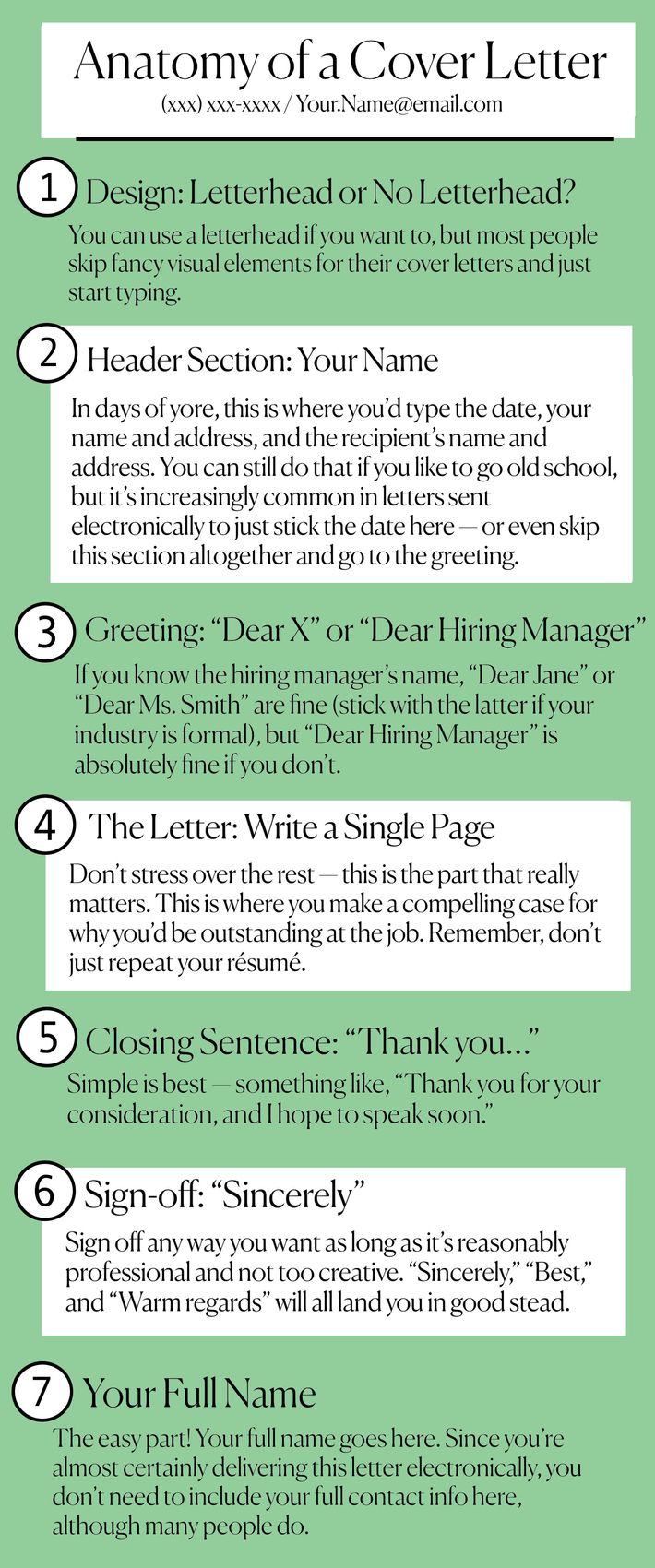
5. If there’s anything unusual or confusing about your candidacy, address it in the letter.
Your cover letter is your chance to provide context for things that otherwise might seem confusing or less than ideal to a hiring manager. For example, if you’re overqualified for the position but are excited about it anyway, or if you’re a bit underqualified but have reason to think you could excel at the job, address that up front. Or if your background is in a different field but you’re actively working to move into this one, say so, talk about why, and explain how your experience will translate. Or if you’re applying for a job across the country from where you live because you’re hoping to relocate to be closer to your family, let them know that.
If you don’t provide that kind of context, it’s too easy for a hiring manager to decide you’re the wrong fit or applying to everything you see or don’t understand the job description and put you in the “no” pile. A cover letter gives you a chance to say, “No, wait — here’s why this could be a good match.”
6. Keep the tone warm and conversational.
While there are some industries that prize formal-sounding cover letters — like law — in most fields, yours will stand out if it’s warm and conversational. Aim for the tone you’d use if you were writing to a co-worker whom you liked a lot but didn’t know especially well. It’s okay to show some personality or even use humor; as long as you don’t go overboard, your letter will be stronger for it.
7. Don’t use a form letter.
You don’t need to write every cover letter completely from scratch, but if you’re not customizing it to each job, you’re doing it wrong. Form letters tend to read like form letters, and they waste the chance to speak to the specifics of what this employer is looking for and what it will take to thrive in this particular job.
If you’re applying for a lot of similar jobs, of course you’ll end up reusing language from one letter to the next. But you shouldn’t have a single cover letter that you wrote once and then use every time you apply; whatever you send should sound like you wrote it with the nuances of this one job in mind.
A good litmus test is this: Could you imagine other applicants for this job sending in the same letter? If so, that’s a sign that you haven’t made it individualized enough to you and are probably leaning too heavily on reciting your work history.
8. No, you don’t need to hunt down the hiring manager’s name.
If you read much job-search advice, at some point you’ll come across the idea that you need to do Woodward and Bernstein–level research to hunt down the hiring manager’s name in order to open your letter with “Dear Matilda Jones.” You don’t need to do this; no reasonable hiring manager will care. If the name is easily available, by all means, feel free to use it, but otherwise “Dear Hiring Manager” is absolutely fine. Take the hour you just freed up and do something more enjoyable with it.
9. Keep it under one page.
If your cover letters are longer than a page, you’re writing too much, and you risk annoying hiring managers who are likely sifting through hundreds of applications and don’t have time to read lengthy tomes. On the other hand, if you only write one paragraph, it’s unlikely that you’re making a compelling case for yourself as a candidate — not impossible, but unlikely. For most people, something close to a page is about right.
10. Don’t agonize over the small details.
What matters most about your cover letter is its content. You should of course ensure that it’s well-written and thoroughly proofread, but many job seekers agonize over elements of the letter that really don’t matter. I get tons of questions from job seekers about whether they should attach their cover letter or put it in the body of the email (answer: No one cares, but attaching it makes it easier to share and will preserve your formatting), or what to name the file (again, no one really cares as long as it’s reasonably professional, but when people are dealing with hundreds of files named “resume,” it’s courteous to name it with your full name).
Approaching your cover letter like this can make a huge difference in your job search. It can be the thing that moves your application from the “maybe” pile (or even the “no” pile) to the “yes” pile. Of course, writing cover letters like this will take more time than sending out the same templated letter summarizing your résumé — but 10 personalized, compelling cover letters are likely to get you more interview invitations than 50 generic ones will.
Find even more career advice from Alison Green on her website, Ask a Manager . Got a question for her? Email [email protected] .
- job interviews
The Cut Shop
Most viewed stories.
- One Hairstylist’s Method for Frizzy Hair
- What We Know About the Astrology Influencer Accused of Killing Her Family
- The Most Messed-up Findings in the Brandy Melville Documentary
- The Brooklyn Power Throuple Making Space for a Baby
- The Painter Whose Long-Distance Boyfriend Has a New Lover
- The Case for Marrying an Older Man
- What It’s Like to Date a Horse
Editor’s Picks

Most Popular
What is your email.
This email will be used to sign into all New York sites. By submitting your email, you agree to our Terms and Privacy Policy and to receive email correspondence from us.
Sign In To Continue Reading
Create your free account.
Password must be at least 8 characters and contain:
- Lower case letters (a-z)
- Upper case letters (A-Z)
- Numbers (0-9)
- Special Characters (!@#$%^&*)
As part of your account, you’ll receive occasional updates and offers from New York , which you can opt out of anytime.
Free cover letter templates for 2024 & beyond: Write letters that land jobs

Summary/Overview
What is a cover letter.
A cover letter for a job is a one-page introductory letter that addresses why you are the right choice for a job. This letter allows you to go further than the information available on your resume and really show off why you’re interested in a position, and why you’re the ideal candidate for whatever the position is.
Why include a cover letter?
Writing a cover letter gives you a chance to provide additional context for your background, experience, education, and skillsets that wouldn’t otherwise be automatically evident from your resume. Cover letters personalize your application and allow the employer to get to know you more before they enter the interview portion of the hiring process.
Not all employers will ask you for a cover letter so be sure to carefully read the application requirements for each position you apply for before you start writing.
How to write a good cover letter:
Begin with the appropriate greeting based on who is hiring or who will be reading this letter. If you don’t know their gender or title, write out their full name. If you don’t know who will be receiving your letter, the standard “To whom it may concern” will suffice.
Examples: Dear Ms. Clalock / Dear Kyle Mills / To whom it may concern
Introduce yourself in the opening paragraph in a way that is personable and highlights why you would be a great fit for the role or company.
Example: I recently saw your posting for Social Media Manager on LinkedIn and felt deeply compelled to apply. I feel my skillset, industry experience, and career goals align with your company’s mission, and I would love the opportunity to grow with your company to further visibility for future campaigns.
Provide context for your interest in the middle paragraphs and explore your relevant experience. Stand out as someone passionate about what this role involves or how this company caters to something you care about.
Example: My responsibilities at these organizations have included content production, content strategy, data mapping, product marketing, and social network development. I developed the company-wide market strategy at WineNet and extended that strategy into a multi-year campaign that benefitted the company and their non-profit partners.
In the closing paragraph, solidify your interest in future correspondence and thank the reader for their time and interest.
Example: Thank you for your time and consideration. I appreciate this opportunity to learn more about your company, and I look forward to sharing in the values of your company’s mission.
End the letter with your signature
Example: Sincerely, Joss Chen
Remember: Know your audience. Tailor how you address your reader based on which industry you’d trying to work within. These letters, though made for template customization, should not be one-size-fits-all.
Features of a good cover letter
- Use referrals if you have them. A cover letter is a perfect setting to let an employer know that you already have a relationship with someone they trust, know, or have employed.
- If you are applying to jobs in multiple industries, it can be helpful to explore your own industry cross-over appeal by developing a cover letter than can be applied to multiple jobs. That way, you can plug-and-play the job titles and information for each individual position for which you apply.
- Length is crucial in writing a cover letter! Be clear, direct, and concise. No cover letter needs to be longer than a page; general rule of thumb is that the longest a cover letter should ever be is 500 words, or the same length as a college application essay.
Common types of cover letters
The three most common types of good cover letters are known as applying, networking, and prospecting. They all have a different place and purpose in the working world.
Applying cover letter:
The applying cover letter is the standard mode of cover letter. It introduces you, explains why you’re interested in the position, and what experience you have that is relevant to the position desired. This letter should turn the flatness of a resume into a compelling story about your passions and strengths, and how they would apply to this particular job. Think of this letter as a concise — but warm-blooded — summation of the value you would bring to this workplace and why you are the best candidate for the role available.
Applying cover letter sample template:

Edit this template
Networking cover letter:
The networking cover letter is fueled by a personal or professional connection. The purpose of this letter mode is to reach out, ask for employment advice, or inquire as to open position referrals within a particular company. This letter is commonly directed at contacts you’ve gained through your industry, past positions, social media platforms like LinkedIn, specific networking events or conferences, or any other environment in which referrals can be passed along. Keep it simple but personable, with the knowledge that the person to which you direct this letter would be helping you out with your job search.
Networking cover letter sample template:

Prospecting cover letter:
The prospecting cover letter is used as outreach to a particular company or business in which you’re interested. If they don’t seem to have any open positions, or perhaps you just have a good feeling about them and want to know more, you can use this letter to inquire about opportunities or make new connections within the company for future use. This style of letter can also be sent to recruiters who hire within a specific industry; upon receiving your letter, they can fold you into their bank of prospective employees to pull from for their clients.
Prospecting cover letter sample template:

Free Adobe Express cover letter templates
With Adobe Express, designing a cover letter that grabs attention and showcases your qualifications is no longer a chore. Explore our collection of best cover letter templates today and land that dream interview!

Free Adobe Express resume templates
Are you also looking to overhaul your resume? Adobe Express makes it easy to present your work history and skillsets with style using these free customizable resume templates .

This post was updated on April 11, 2024.
Try Adobe Express today
Ready to create standout content?
Start for free
Explore more related posts
https://www.adobe.com/express/learn/blog/introducing-thousands-of-design-assets-for-every-mood
https://www.adobe.com/express/learn/blog/sage-green-aesthetic
https://www.adobe.com/express/learn/blog/presentation-animation

How to Write a Cover Letter That Will Get You a Job
I ’ve read thousands, maybe tens of thousands, of cover letters in my career. If you’re thinking that sounds like really boring reading, you’re right. What I can tell you from enduring that experience is that most cover letters are terrible — and not only that, but squandered opportunities. When a cover letter is done well, it can significantly increase your chances of getting an interview, but the vast majority fail that test.
So let’s talk about how to do cover letters right.
First, understand the point of a cover letter.
The whole idea of a cover letter is that it can help the employer see you as more than just your résumé. Managers generally aren’t hiring based solely on your work history; your experience is crucial, yes, but they’re also looking for someone who will be easy to work with, shows good judgment, communicates well, possesses strong critical thinking skills and a drive to get things done, complements their current team, and all the other things you yourself probably want from your co-workers. It’s tough to learn much about those things from job history alone, and that’s where your cover letter comes in.
Because of that …
Whatever you do, don’t just summarize your résumé.
The No. 1 mistake people make with cover letters is that they simply use them to summarize their résumé. This makes no sense — hiring managers don’t need a summary of your résumé! It’s on the very next page! They’re about to see it as soon as they scroll down. And if you think about it, your entire application is only a few pages (in most cases, a one- or two-page résumé and a one-page cover letter) — why would you squander one of those pages by repeating the content of the others? And yet, probably 95 percent of the cover letters I see don’t add anything new beyond the résumé itself (and that’s a conservative estimate).
Instead, your cover letter should go beyond your work history to talk about things that make you especially well-suited for the job. For example, if you’re applying for an assistant job that requires being highly organized and you neurotically track your household finances in a detailed, color-coded spreadsheet, most hiring managers would love to know that because it says something about the kind of attention to detail you’d bring to the job. That’s not something you could put on your résumé, but it can go in your cover letter.
Or maybe your last boss told you that you were the most accurate data processor she’d ever seen, or came to rely on you as her go-to person whenever a lightning-fast rewrite was needed. Maybe your co-workers called you “the client whisperer” because of your skill in calming upset clients. Maybe you’re regularly sought out by more senior staff to help problem-solve, or you find immense satisfaction in bringing order to chaos. Those sorts of details illustrate what you bring to the job in a different way than your résumé does, and they belong in your cover letter.
If you’re still stumped, pretend you’re writing an email to a friend about why you’d be great at the job. You probably wouldn’t do that by stiffly reciting your work history, right? You’d talk about what you’re good at and how you’d approach the work. That’s what you want here.
You don’t need a creative opening line.
If you think you need to open the letter with something creative or catchy, I am here to tell you that you don’t. Just be simple and straightforward:
• “I’m writing to apply for your X position.”
• “I’d love to be considered for your X position.”
• “I’m interested in your X position because …”
• “I’m excited to apply for your X position.”
That’s it! Straightforward is fine — better, even, if the alternative is sounding like an aggressive salesperson.
Show, don’t tell.
A lot of cover letters assert that the person who wrote it would excel at the job or announce that the applicant is a skillful engineer or a great communicator or all sorts of other subjective superlatives. That’s wasted space — the hiring manager has no reason to believe it, and so many candidates claim those things about themselves that most managers ignore that sort of self-assessment entirely. So instead of simply declaring that you’re great at X (whatever X is), your letter should demonstrate that. And the way you do that is by describing accomplishments and experiences that illustrate it.
Here’s a concrete example taken from one extraordinarily effective cover-letter makeover that I saw. The candidate had originally written, “I offer exceptional attention to detail, highly developed communication skills, and a talent for managing complex projects with a demonstrated ability to prioritize and multitask.” That’s pretty boring and not especially convincing, right? (This is also exactly how most people’s cover letters read.)
In her revised version, she wrote this instead:
“In addition to being flexible and responsive, I’m also a fanatic for details — particularly when it comes to presentation. One of my recent projects involved coordinating a 200-page grant proposal: I proofed and edited the narratives provided by the division head, formatted spreadsheets, and generally made sure that every line was letter-perfect and that the entire finished product conformed to the specific guidelines of the RFP. (The result? A five-year, $1.5 million grant award.) I believe in applying this same level of attention to detail to tasks as visible as prepping the materials for a top-level meeting and as mundane as making sure the copier never runs out of paper.”
That second version is so much more compelling and interesting — and makes me believe that she really is great with details.
If there’s anything unusual or confusing about your candidacy, address it in the letter.
Your cover letter is your chance to provide context for things that otherwise might seem confusing or less than ideal to a hiring manager. For example, if you’re overqualified for the position but are excited about it anyway, or if you’re a bit underqualified but have reason to think you could excel at the job, address that up front. Or if your background is in a different field but you’re actively working to move into this one, say so, talk about why, and explain how your experience will translate. Or if you’re applying for a job across the country from where you live because you’re hoping to relocate to be closer to your family, let them know that.
If you don’t provide that kind of context, it’s too easy for a hiring manager to decide you’re the wrong fit or applying to everything you see or don’t understand the job description and put you in the “no” pile. A cover letter gives you a chance to say, “No, wait — here’s why this could be a good match.”
Keep the tone warm and conversational.
While there are some industries that prize formal-sounding cover letters — like law — in most fields, yours will stand out if it’s warm and conversational. Aim for the tone you’d use if you were writing to a co-worker whom you liked a lot but didn’t know especially well. It’s okay to show some personality or even use humor; as long as you don’t go overboard, your letter will be stronger for it.
Don’t use a form letter.
You don’t need to write every cover letter completely from scratch, but if you’re not customizing it to each job, you’re doing it wrong. Form letters tend to read like form letters, and they waste the chance to speak to the specifics of what this employer is looking for and what it will take to thrive in this particular job.
If you’re applying for a lot of similar jobs, of course you’ll end up reusing language from one letter to the next. But you shouldn’t have a single cover letter that you wrote once and then use every time you apply; whatever you send should sound like you wrote it with the nuances of this one job in mind.
A good litmus test is this: Could you imagine other applicants for this job sending in the same letter? If so, that’s a sign that you haven’t made it individualized enough to you and are probably leaning too heavily on reciting your work history.
No, you don’t need to hunt down the hiring manager’s name.
If you read much job-search advice, at some point you’ll come across the idea that you need to do Woodward and Bernstein–level research to hunt down the hiring manager’s name in order to open your letter with “Dear Matilda Jones.” You don’t need to do this; no reasonable hiring manager will care. If the name is easily available, by all means, feel free to use it, but otherwise “Dear Hiring Manager” is absolutely fine. Take the hour you just freed up and do something more enjoyable with it.
Keep it under one page.
If your cover letters are longer than a page, you’re writing too much, and you risk annoying hiring managers who are likely sifting through hundreds of applications and don’t have time to read lengthy tomes. On the other hand, if you only write one paragraph, it’s unlikely that you’re making a compelling case for yourself as a candidate — not impossible, but unlikely. For most people, something close to a page is about right.
Don’t agonize over the small details.
What matters most about your cover letter is its content. You should of course ensure that it’s well-written and thoroughly proofread, but many job seekers agonize over elements of the letter that really don’t matter. I get tons of questions from job seekers about whether they should attach their cover letter or put it in the body of the email (answer: No one cares, but attaching it makes it easier to share and will preserve your formatting), or what to name the file (again, no one really cares as long as it’s reasonably professional, but when people are dealing with hundreds of files named “resume,” it’s courteous to name it with your full name).
Approaching your cover letter like this can make a huge difference in your job search. It can be the thing that moves your application from the “maybe” pile (or even the “no” pile) to the “yes” pile. Of course, writing cover letters like this will take more time than sending out the same templated letter summarizing your résumé — but 10 personalized, compelling cover letters are likely to get you more interview invitations than 50 generic ones will.
- ‘I Had a Great Job Interview — Why Haven’t I Heard Back?’
- How to Answer ‘Tell Me About Yourself’ in a Job Interview

Is a Cover Letter Necessary in 2024?
Published: April 03, 2024
Writing a cover letter can be daunting.

I’ll never forget my college career coach, who made writing a cover letter look easy. Even with her tips, I’ve always found it incredibly difficult to talk about myself and hype up my accomplishments.
While it acts as a letter of introduction, I’ve wondered if a cover letter is necessary in 2024. To find out, I spoke with two recruiters and gained insights on how to write the best cover letter for any job application.
![how to write a backstage cover letter → Click here to access 5 free cover letter templates [Free Download]](https://no-cache.hubspot.com/cta/default/53/3f347702-d7e9-4e59-9fe4-be4cd7bad191.png)
How important is a cover letter?
Is a cover letter necessary, when to skip a cover letter, when to include a cover letter, tips for writing a cover letter, what if the cover letter is optional.
Cover letters are short letters of introduction that you include with job applications.
Typically, they are your chance to go into deeper details about your accomplishments that you might not have highlighted or had room to mention on your resume.
Tiffany Hall, a professional resume writer and founder of Resume911 , says cover letters are an important part of the job application process.
Hall says, “Cover letters can be very important. It’s supposed to sell why you, of all applicants, should get the job. The issue is that applicants use them to regurgitate what’s on their resume, and that’s not what it’s for. It should speak to what isn’t easily explained with your resume.”
.png)
5 Free Cover Letter Templates
Five fill-in-the-blank cover letter templates to help you impress recruiters.
- Standard Cover Letter Template
- Entry-Level Cover Letter Template
- Data-Driven Cover Letter Template
You're all set!
Click this link to access this resource at any time.
For example, if your resume says you’re skilled at building web pages, your cover letter is a great place to name-drop companies that you’ve worked for to create their websites.
Matthew Muehleisen, a corporate recruiter , thinks a cover letter is also a great place to show you’ve done your homework and researched a company.
Muehleisen says, “It can be what sets you apart from other candidates and applicants and is a good opportunity to show that you’ve done research on the position and company to further showcase your interest in the role.”
Knowing the importance of a cover letter still begs the question: Is a cover letter necessary in 2024?
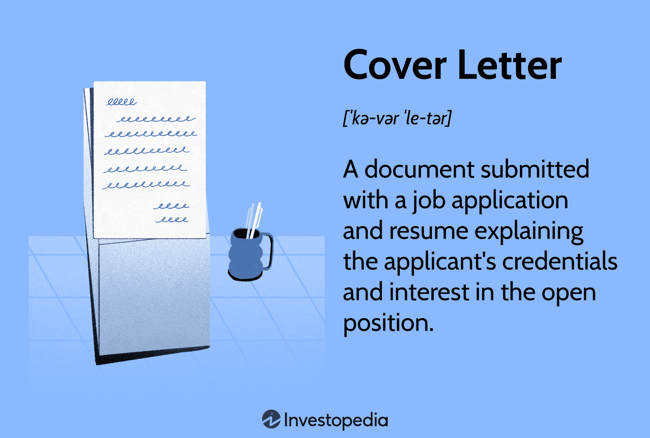
Image Source
While a cover letter can help demonstrate your knowledge of the company you’re applying to and highlight more of your achievements, both Hall and Muehleisen agree that a cover letter isn’t entirely necessary.
Muehleisen says, “Unless it’s a requirement of the application, I wouldn’t say it’s necessary to include a cover letter. There are some roles (usually in content creation and marketing) that will ask for a cover letter as a form of a writing sample. In these instances, make sure your letter is polished and focused.”
If Hall had her way, she would eliminate the cover letter entirely, focus more on the resume, and ask for a link to an applicant’s LinkedIn profile.
According to Hall, “Most cover letters either repeat the resume or they speak to why the applicant isn’t a good fit. Neither is the purpose of a cover letter.”
Nevertheless, 74% of hiring managers still prefer applications to include a cover letter. So, it is definitely worth considering including one — even if the application says it’s optional.
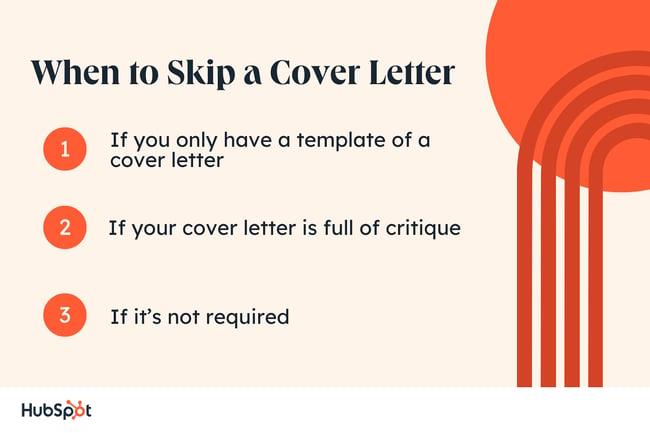
If you’re looking for a new role, writing a cover letter can be time-consuming — especially if you take the time to personalize every letter you send to a hiring manager.
Although a cover letter does serve a legitimate purpose, and 83% of hiring managers read it, there are a few situations where you shouldn’t include a cover letter. Let’s take a look at those scenarios.
If You Only Have a Template of a Cover Letter
I get it. Writing an effective cover letter takes a significant amount of time.
But consider not sending one if you only have time to plug your information into a cover letter template without personalizing it before hitting submit on an application.
Don’t get me wrong. A cover letter template is a great starting point to write your cover letter. Templates often remind you to include pertinent information like the hiring manager’s title, name, and your contact information.
However, if you don’t take the time to edit the body of the cover letter and personalize it with research and your relevant experience, you risk sending the same letter as another candidate.
And considering that 48% of hiring managers spend anywhere from 30 seconds to two full minutes reading each cover letter, the chances are high that your hiring manager can spot a form letter a mile away.
Don’t send it if you don’t have the time to personalize a cover letter.
If Your Cover Letter Is Full of Critique
A cover letter is meant to explain why you’re the best candidate for the open position. However, a cover letter is not a place for you to share your ideas of how the company can improve.
Sure, every company likely has areas of improvement, and the job you’re applying for might be the role that gets a say in that, but a list of improvements might read as a critique.
You don’t want to potentially offend a hiring manager before you even get an interview. A bad cover letter can hurt a strong candidate, according to 33% of hiring managers .
Before you submit your cover letter, read through it several times to make sure it’s not a critique. If it does sound like a critique, throw it out.
If It’s Not Required
There are other instances where you shouldn’t send a cover letter. For example, if the application’s instructions specifically state that you do not need to submit a cover letter for consideration for the job.
In fact, sending a cover letter anyway can signal to the hiring manager that you don’t follow instructions. Not following instructions is also a great way to land your application in the trash bin.
The bottom line is this: If the application specifically states not to send a cover letter, don’t send it.
Of hiring managers, 74% prefer to see job applications with a cover letter apart from the resume. Knowing this, if you have the time to include a cover letter with your job application, don’t skip it.
Here are three instances when you should send a cover letter with your application.
Send a cover letter if you’re very interested in the role.
Think of your cover letter as your time to shine. Use it as a place to highlight your experiences and the qualifications that make you a great fit for the position.
Hall says, “If you can speak to why you’re a good candidate without copying your resume in paragraph form, include a cover letter.”
In other words, don’t use bullet points in your cover letter to describe your previous employment history.
Instead, talk about what you learned on the job and how your skills will help you excel in the role you’re applying for.
Send a cover letter when there’s a gap in your resume or you’re transitioning industries.
If you’re looking to transition to another industry, you should definitely include a cover letter with your application.
Speaking from personal experience, if I had only submitted a resume to my school district when I applied to be a Spanish teacher, the hiring manager would have just seen my experience in Public Health and would not have known about my skills and success in tutoring students in Spanish.
Muehleisen puts it this way, “If you’re looking to transition to a new industry or if there is a position and company you’re really excited about pursuing as an opportunity, these are the best instances to include a cover letter so that you can possibly give yourself an advantage.”
A cover letter can also help explain any gaps in your resume — especially if the gap in your employment history is beneficial to the role you’re applying for.
For example, maybe you volunteered in South America, and the role you’re applying for is for a position in Global Operations.
It never hurts to include positive, pertinent information in your cover letter.
Send a cover letter when it’s required.
The most obvious time to include a cover letter with your application is when it is required. Just like not including a cover letter when it’s not required, it shows you can follow directions.
Include a cover letter when the application asks you to submit one, which shows you can follow directions.
Plus, if the application asks for a cover letter, you can bet the hiring manager will look for it. If no cover letter is included, well, you’re sabotaging your chances of getting an interview.
Only 13% of hiring managers will consider giving a candidate an interview if they don’t attach a required cover letter to an application.
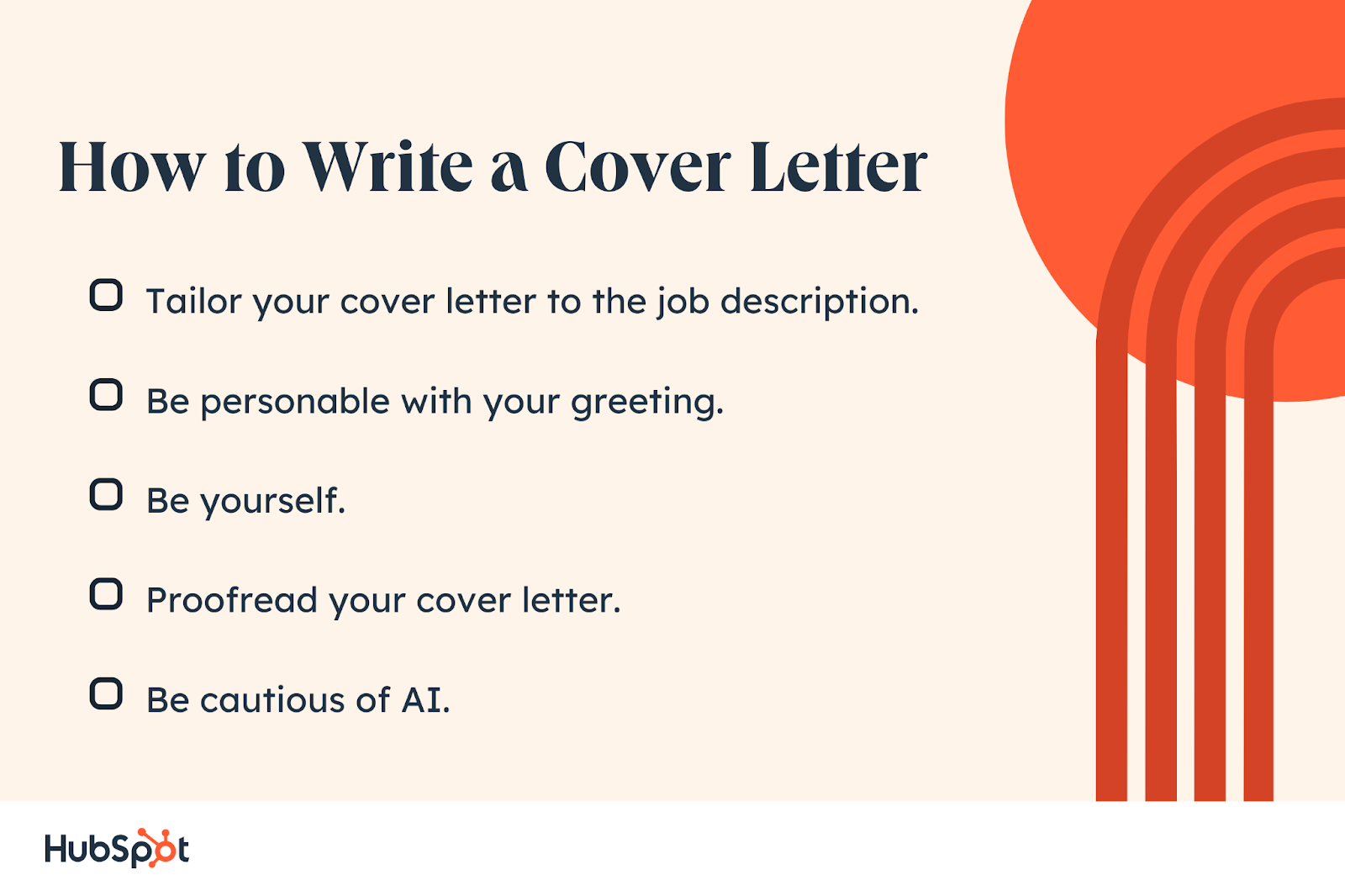
Writing a cover letter is not as painful as it sounds. There are great templates you can use as a starting point for your cover letter.
The trick with a template, though, is to make sure you always personalize the letter to your own experiences and qualifications.
Here are five expert tips to write a winning cover letter.
1. Tailor your cover letter to the job description.
When writing a cover letter, especially if you use a cover letter template, you should tailor the letter to match the job description and meet the requirements of the application.
For example, if the application asks you to attach a short cover letter, keep it brief. Your best bet is one to two short paragraphs detailing why you’re a great fit for the position.
You’ll also want to reference keywords from the job description in your cover letter. Many recruiters use applicant tracking systems that scan application packets for the best fit.
Often, hiring managers review the applications that match the keywords first.
Now, that doesn’t mean to stuff your cover letter with keywords. Instead, use them in a natural way as you discuss your qualifications.
2. Be personable with your greeting.
You might have seen the advice telling you to use “To Whom It May Concern” instead of the hiring manager’s name. This is good advice, but only if you do not know the hiring manager.
Before resorting to a generic greeting to start your cover letter, take the time to look on the company’s website and LinkedIn to find out who makes hiring decisions.
If you have contacts in your network who are familiar with the company, ask them. Taking the time to research the hiring manager and the company shows you care about the details — a quality many hiring managers look for in a candidate!
If you’re still unsure after researching the company, consider using “Dear Sir or Madam” as your greeting.
3. Be yourself.
While a cover letter is a formal introduction of yourself to a potential employer, it doesn’t need to be lacking in personality. Hall suggests sprinkling your personality in your cover letter to spark connections with the hiring manager.
Hall says, “Be your best professional self. I’m a foodie and will include references to food on my LinkedIn, and I’ve done it in a cover letter. I’ve had managers reference them, and we had a chuckle. I am also very clear about aligning myself with companies whose mission and goals I respect and can contribute to. I make sure to speak to that in the cover letter.”
Take Hall’s advice. Showcasing your vibrant personality in your cover letter can help break the ice in your interview!
4. Proofread your cover letter.
Once you’ve written your cover letter and before you hit “send,” double-check that it is free from spelling and grammar errors and that the company you referenced is the company you are applying to.
Muehleisen says skipping proofreading your cover letter is a big mistake — and it could cost you the job!
Muehleisen says, “Make sure that you are proofreading prior to sending. If the cover letter feels like it is a simple cut/paste or if the job title and company name are incorrect, it may do more harm than good. So, be sure that what you’re sending is pertinent.”
5. Be cautious of AI.
AI tools, like ChatGPT or Claude, are great for helping draft content. You might be tempted to ask generative AI to write your cover letter for you. However, both Hall and Muehleisen say to proceed with caution when it comes to AI.
Hall says, “AI is coming along in amazing ways, so it may come as a surprise that my best tip didn’t include AI. I tell my clients when they’re stuck to look to their peers. You can search people by job title on LinkedIn. See how they describe themselves and pull from there. Or, hire a resume writer or career strategist to help you.”
Muehleisen agrees with her. He says, “I would hesitate to use a tool or service for a cover letter as the point should be to show your authenticity. If you are going to use AI for assistance, make sure to put your own words in as well.”
However, when you write your cover letter, whether using a template or generative AI, personalizing it is key to standing out from the competition.
If the job description says a cover letter is optional, should you send one, or can you get by without it?
That can be tricky, considering 72% of recruiters still expect a cover, even if it’s optional.
According to Muehleisen, sending a cover letter is not a bad idea. He says, “I’ve never heard of a cover letter hurting an applicant’s chances; just make sure the one you’re including is specific to the job description and posting.”
Check out these cover letter examples for more inspiration.
Experiment With Your Cover Letters
Writing a cover letter is a breeze once you get the hang of it. With today’s challenging job market, sending a cover letter with your application can make a difference in whether you get called for an interview.
I can’t make promises that your cover letter will dazzle hiring managers each time, but for the right position for you, it will.
Remember Hall and Muehleisen’s advice when you craft your cover letter. Personalization is key to success!

Don't forget to share this post!
Related articles.

The 23 Best Cover Letter Examples: What They Got Right
![how to write a backstage cover letter How to Write a Cover Letter for an Internship [Examples & Template]](https://blog.hubspot.com/hubfs/Copy%20of%20Featured%20Image%20Template%20Backgrounds-Aug-21-2023-02-03-52-3390-PM.png)
How to Write a Cover Letter for an Internship [Examples & Template]
![how to write a backstage cover letter Letter of Interest Tips, Templates & Examples [A 2023 Guide]](https://blog.hubspot.com/hubfs/letter%20of%20interest.png)
Letter of Interest Tips, Templates & Examples [A 2023 Guide]

15 Cover Letter Templates to Perfect Your Next Job Application

The Ultimate Guide to Writing a Cover Letter
![how to write a backstage cover letter How to Start a Cover Letter to Impress Employers [+ 14 Examples]](https://blog.hubspot.com/hubfs/how-to-start-a-cover-letter.jpg)
How to Start a Cover Letter to Impress Employers [+ 14 Examples]

Eight Cover Letter Greetings for Every Situation

7 Expert Cover Letter Tips to Get the Job
Marketing software that helps you drive revenue, save time and resources, and measure and optimize your investments — all on one easy-to-use platform

IMAGES
VIDEO
COMMENTS
Here are our tips on how to craft that perfect cover letter that will help start your business relationship off on the right foot. Greet the Person Who Posted the Job. On each casting notice you should see the name of the person who posted the job under the Company section. Remember that name and use it when writing the greeting in your cover ...
To write an effective cover letter, tailor it to the specific agent or casting director, be concise, and proofread thoroughly for errors. You may also want to consider examples and tips from reputable sources like Reddit threads or websites such as Jharman, MyPerfectResume, and Backstage. Understanding Acting Cover Letters.
Here's what I write in the cover letter section on Backstage casting and other casting sites. Link to Backstage's blog post on this subject! https://backstag...
There are two types of cover letters you'll need to know how to write as you move forward in your acting career: Submissions Notes: These are short 2-3 sentence notes you can attach to your submissions on online casting websites like Backstage, Actor's Access, etc. Standard Acting Cover Letters: These are longer cover letters (usually sent via email) designed to capture the attention of ...
Here is a sample Backstage cover letter you can use as writing props. Please note that it is much shorter than other types of cover letters and also features some deets that are not really seen in other cover letters. This is largely due to the casting process. This letter is written by a male actor seeking an audition for an upcoming situation ...
Here's mine! I usually personalize the first paragraph based on what the project type is (theater vs film vs dance) and the second paragraph to reflect something about the project. Hope this helps! :) Greetings! I am a NYC based actress, singer & dancer. My past credits include National Commercials, Web-series, short films, Shakespeare, drama ...
Step 3: Address your cover letter to the hiring manager—preferably by name. The most traditional way to address a cover letter is to use the person's first and last name, including "Mr." or "Ms." (for example, "Dear Ms. Jane Smith" or just "Dear Ms. Smith").
Tips for an Acting Cover Letter. When crafting an acting cover letter, consider these specific tips: 1. Do Your Research: Understand the production, director, and character. Tailor your letter to show that you've done your homework. 2. Be Concise but Detailed: Focus on what makes you a fit for this particular role.
Visually Match Your Resumé. The heading of your letter should correlate with your resumé, the font should be the same and the paper (if you're printing it) should also be the same. Along with your resume, your cover letter is part of a pair, and this pair should be visually consistent.
Let's get into how to write a cover letter, step by step: Step 1: How to Address a Cover Letter. When addressing your cover letter, it's essential to find out the name and title of the hiring manager or recruiter whenever possible. Addressing the letter to a specific individual adds a personal touch and demonstrates your initiative.
Step #4 - Write an Attention-Grabbing Introduction. First impressions matter, especially when it comes to your job search. Recruiters get hundreds, sometimes even thousands, of applications. Chances are, they're not going to be reading every single cover letter end-to-end.
1. Personalization. Address the hiring manager or recruiter by name whenever possible. If the job posting doesn't include a name, research to find out who will be reviewing applications. Personalizing your cover letter shows that you've taken the time to tailor your application to the specific company and role. 2.
Include the name of the person to whom you are writing as well as the company name and address just above the salutation. In the salutation, greet the hiring manager by name. If you don't know the name of the person, consider greeting the hiring department or the department with which you would be working if hired. 3.
Middle paragraph (s) Closing paragraph. Letter ending and signature. Your cover letter should be one page long and use a simple, professional font, such as Arial or Helvetica, 10 to 12 points in size. Your letter should be left-aligned with single spacing and one-inch margins. Show Transcript.
If you think you need to open the letter with something creative or catchy, I am here to tell you that you don't. Just be simple and straightforward: • "I'm writing to apply for your X position.". • "I'd love to be considered for your X position.". • "I'm interested in your X position because …".
To recap the main points of how to write a good cover letter, keep these tips in mind: Write a fresh, custom cover letter for every job you apply to. Keep it to three to four paragraphs under one page. Use your cover letter to expand on details in your resume and tell a story. Ensure your document is free of errors.
To start your cover letter, introduce yourself. This means including your full name, your specific interest in the position and the reasons you've chosen to apply. If you got a referral to the job from another party, ensure to mention this in the first paragraph. 2. Mention your skills and qualifications.
3. Know the Company . Take the time to research the company you are applying to so that you can express how your experience can help. Plus, having knowledge of the company is ideal for when you ...
Get free cover letter templates and writing tips to craft a standout application. Free cover letter templates for 2024 & beyond: Write letters that land jobs. Summary/Overview. Levels. 1. What is a cover letter? A cover letter for a job is a one-page introductory letter that addresses why you are the right choice for a job. This letter allows ...
So let's talk about how to do cover letters right., First, understand the point of a cover letter., The whole idea of a cover letter is that it can help the employer see you as more than just ...
Tips for Writing a Cover Letter. Writing a cover letter is not as painful as it sounds. There are great templates you can use as a starting point for your cover letter. The trick with a template, though, is to make sure you always personalize the letter to your own experiences and qualifications. Here are five expert tips to write a winning ...
Theo Harrington Atlanta, Georgia 771-555-0199 [email protected] April 29, 2023 Dear hiring manager, My name is Theo Harrington, and I'm writing to express my interest in the open position of Public Relations Manager at Morningside Critical Care Hospital. As an experienced public relations professional with over six years of experience in the health care industry, I'm eager to bring my ...